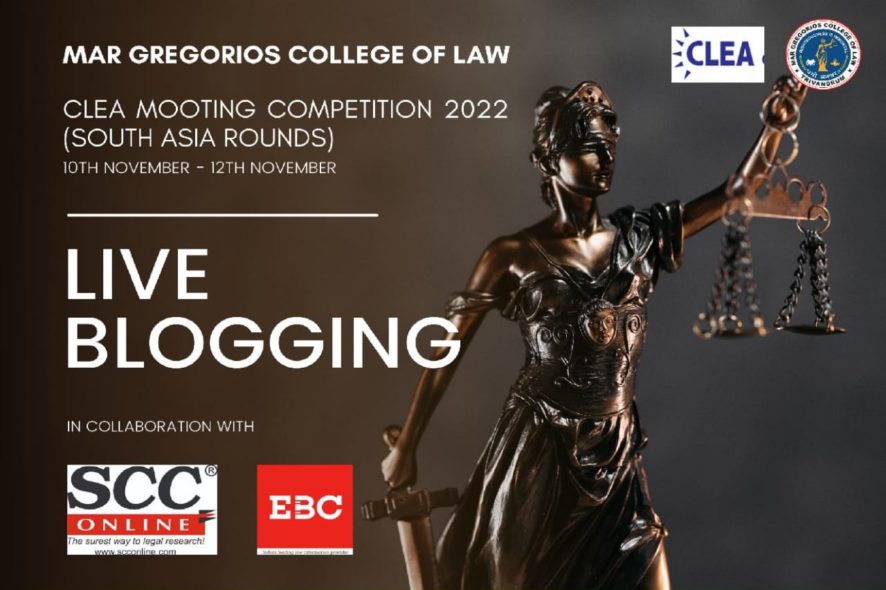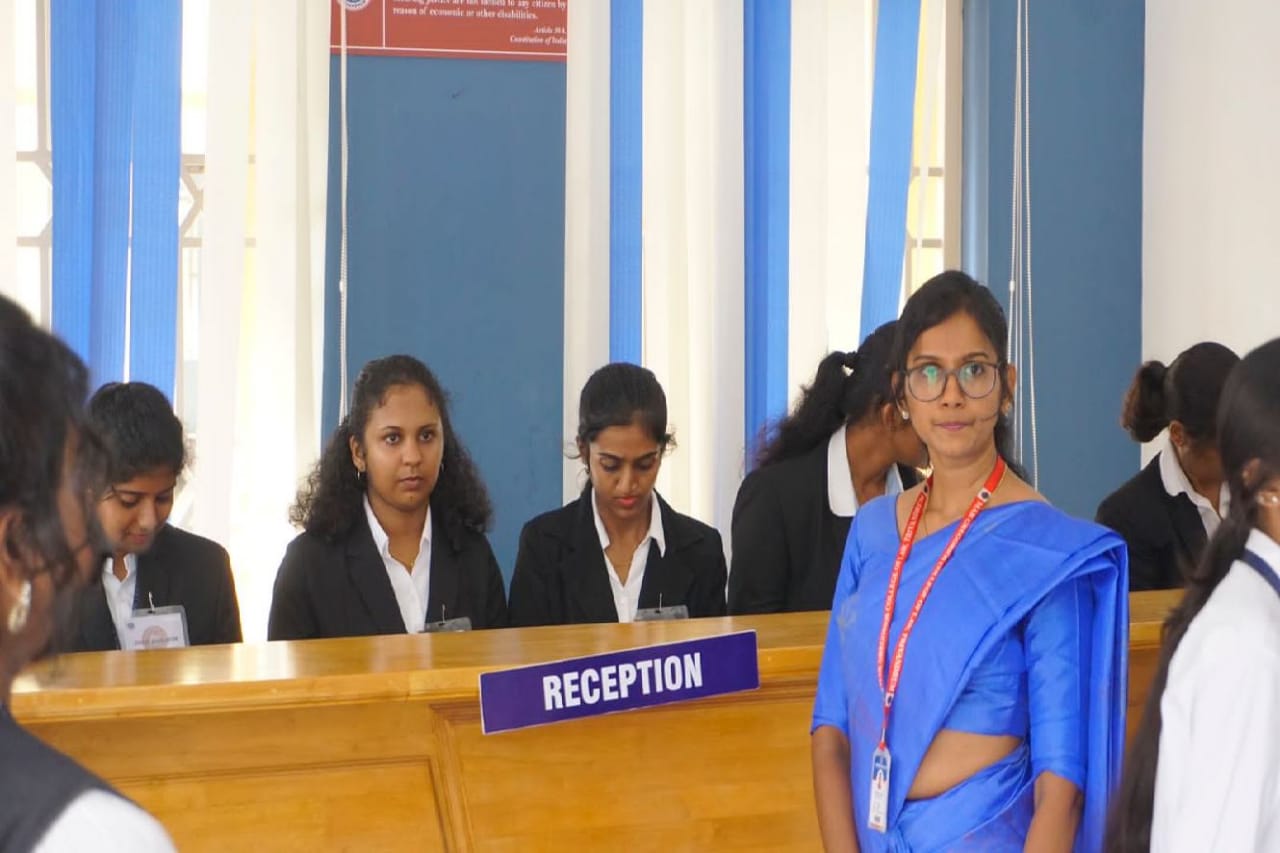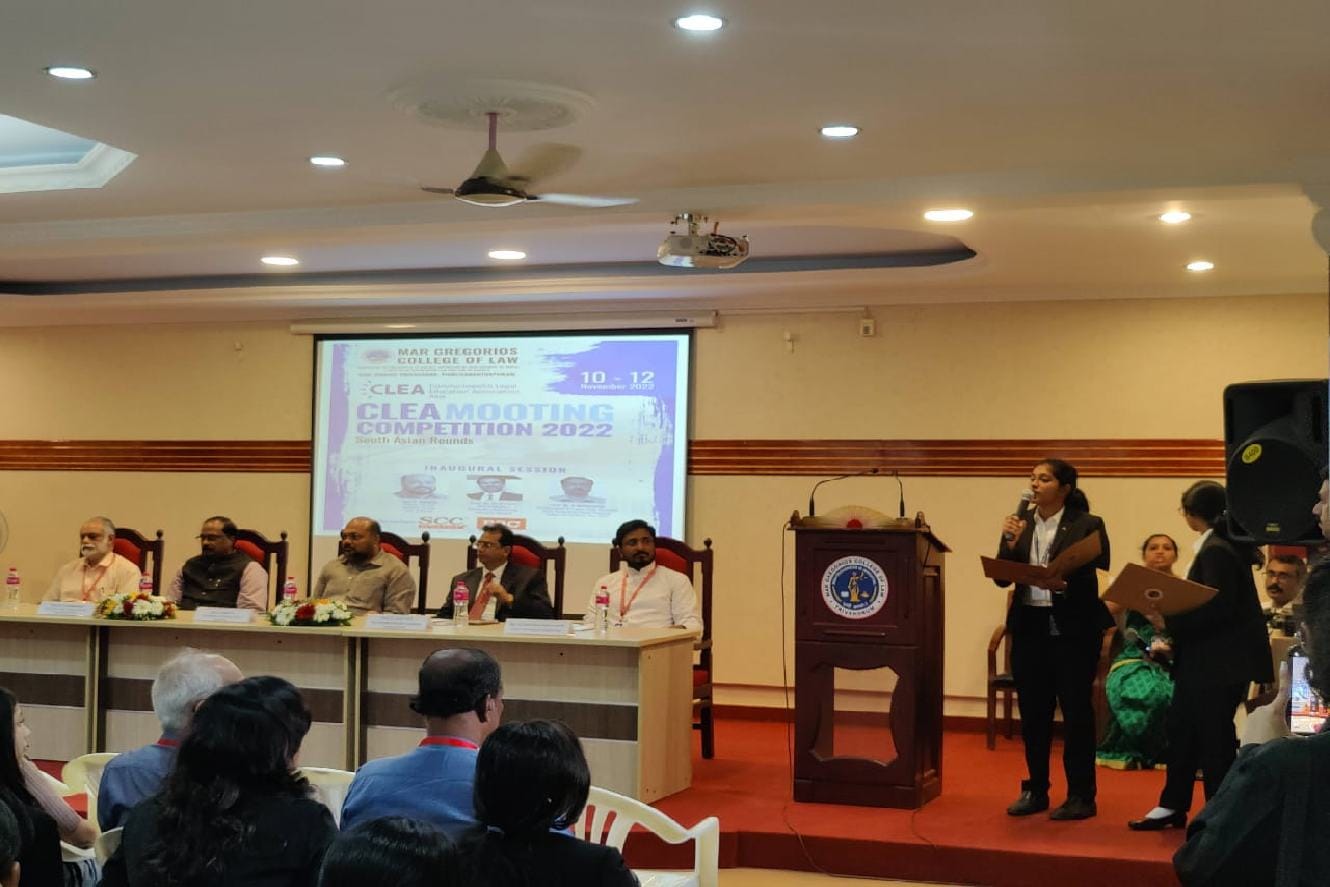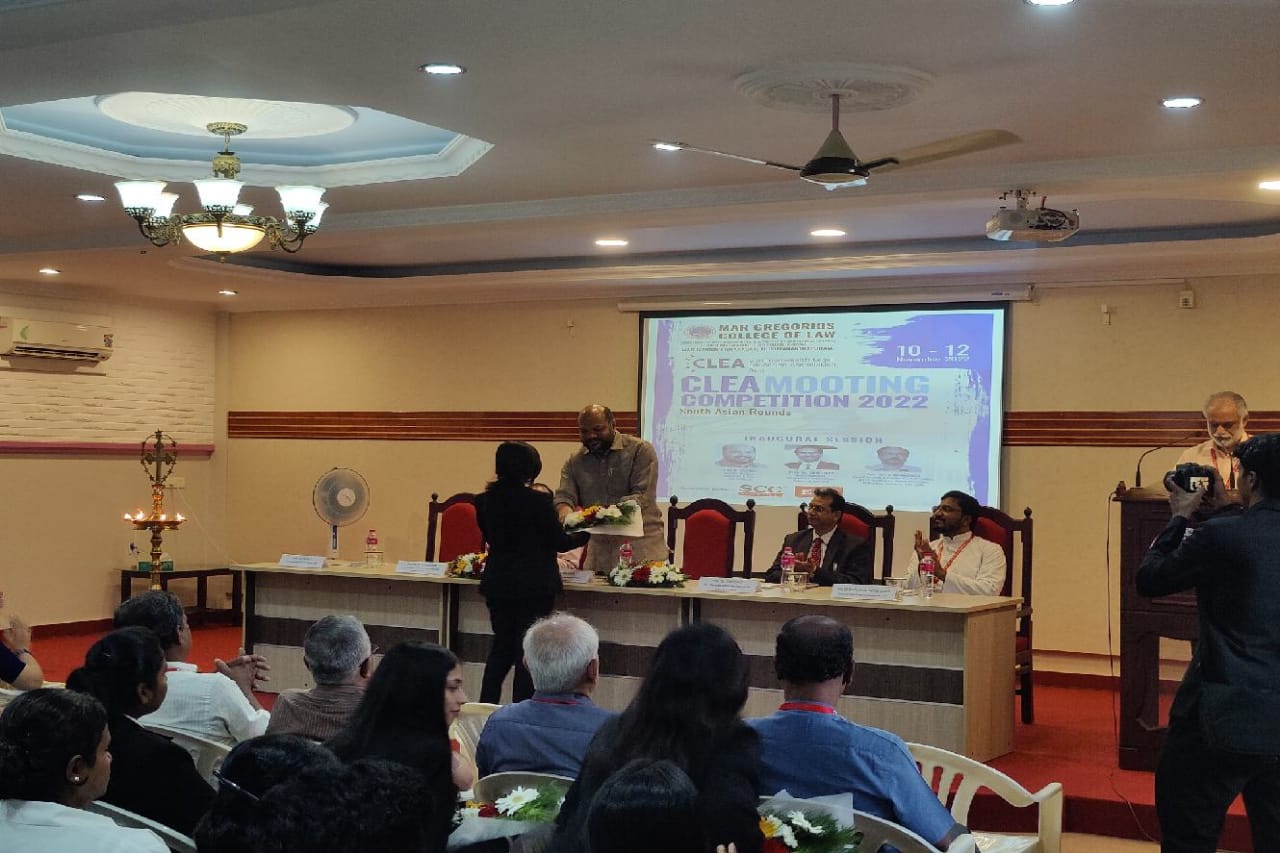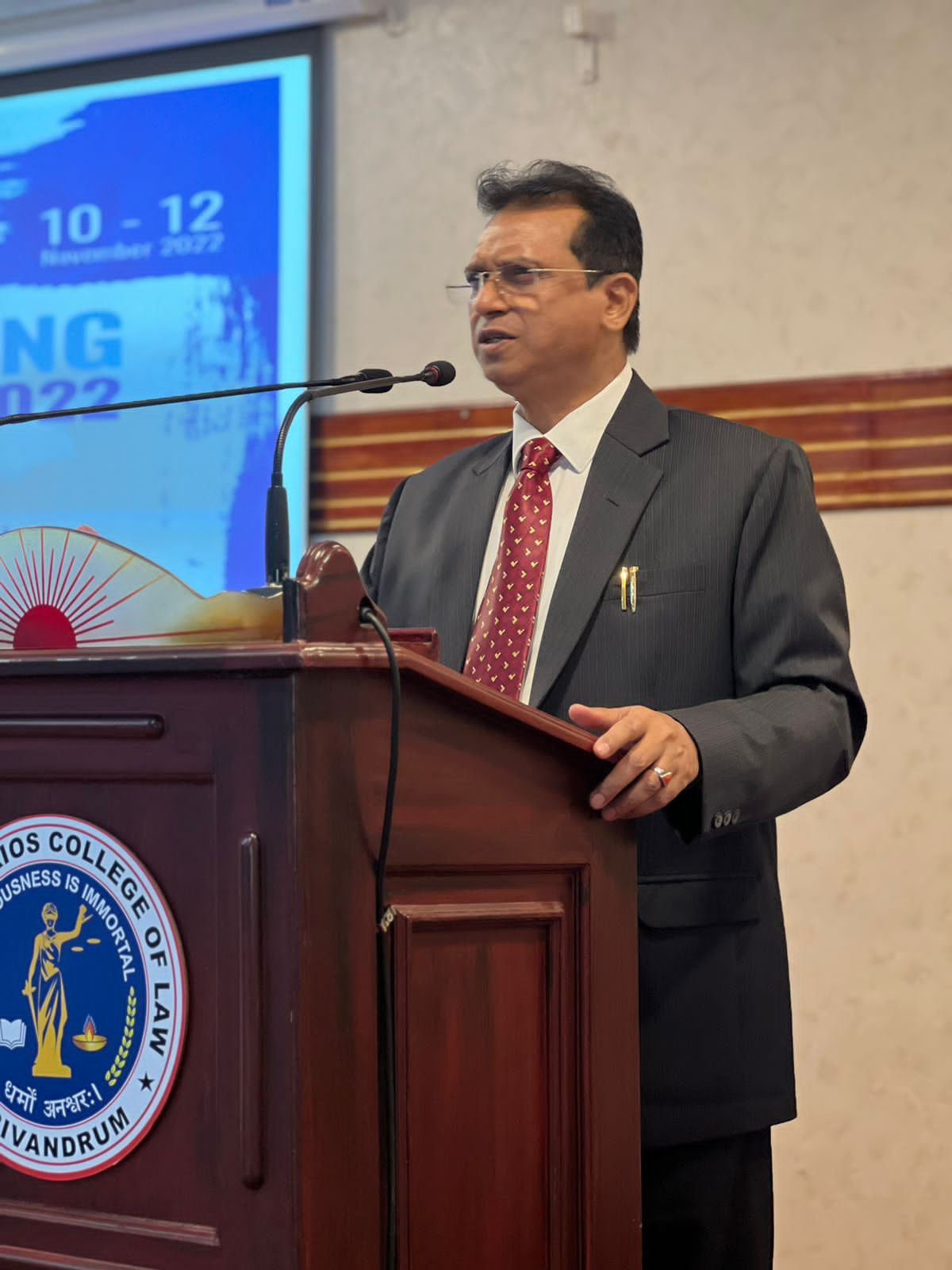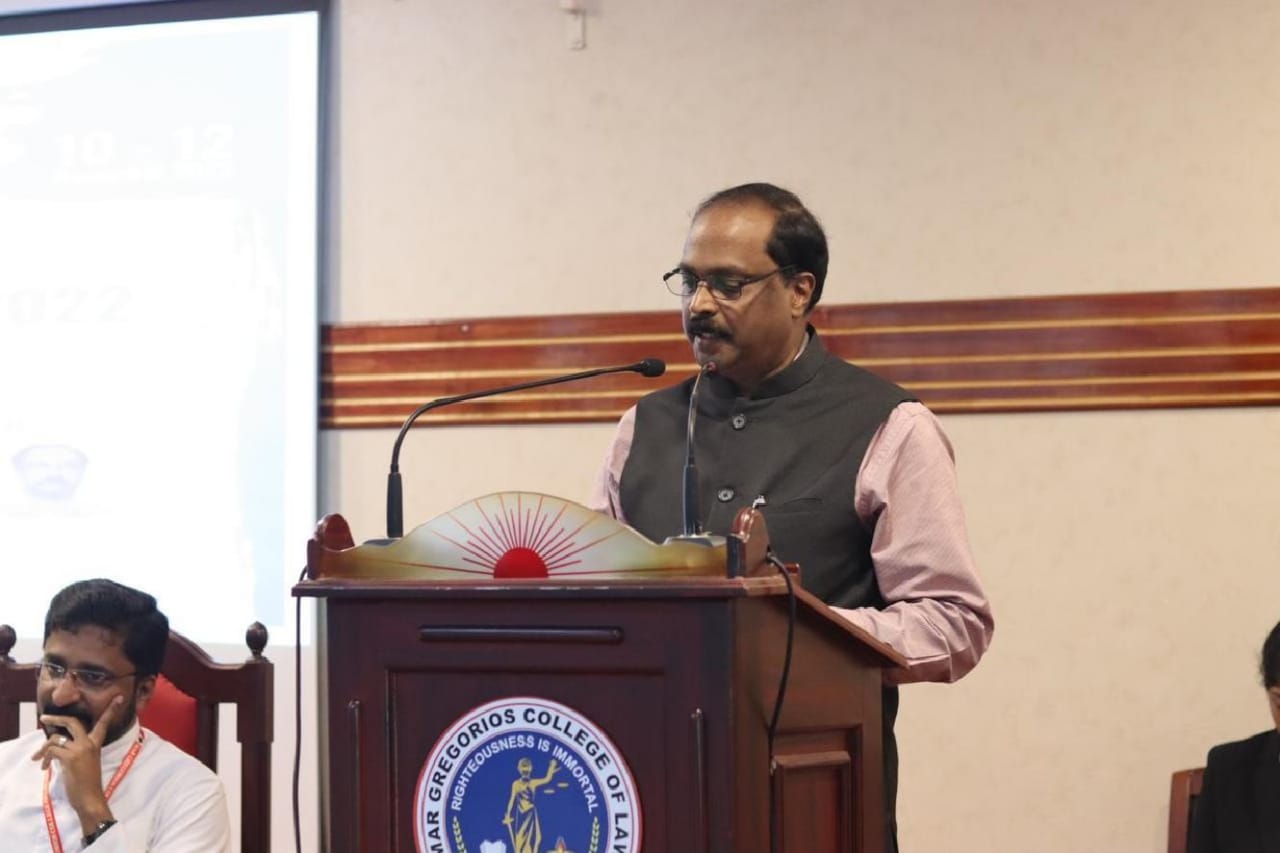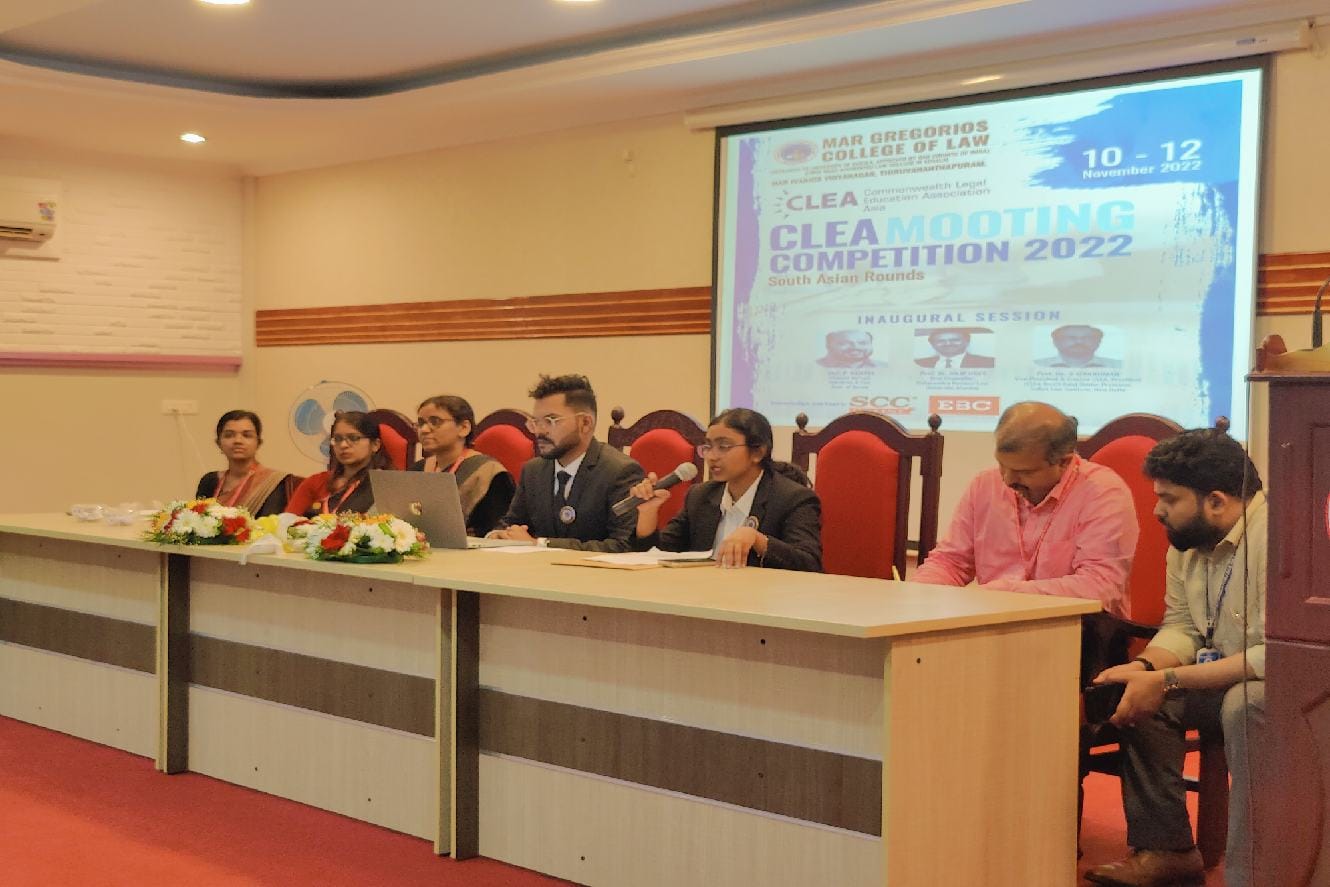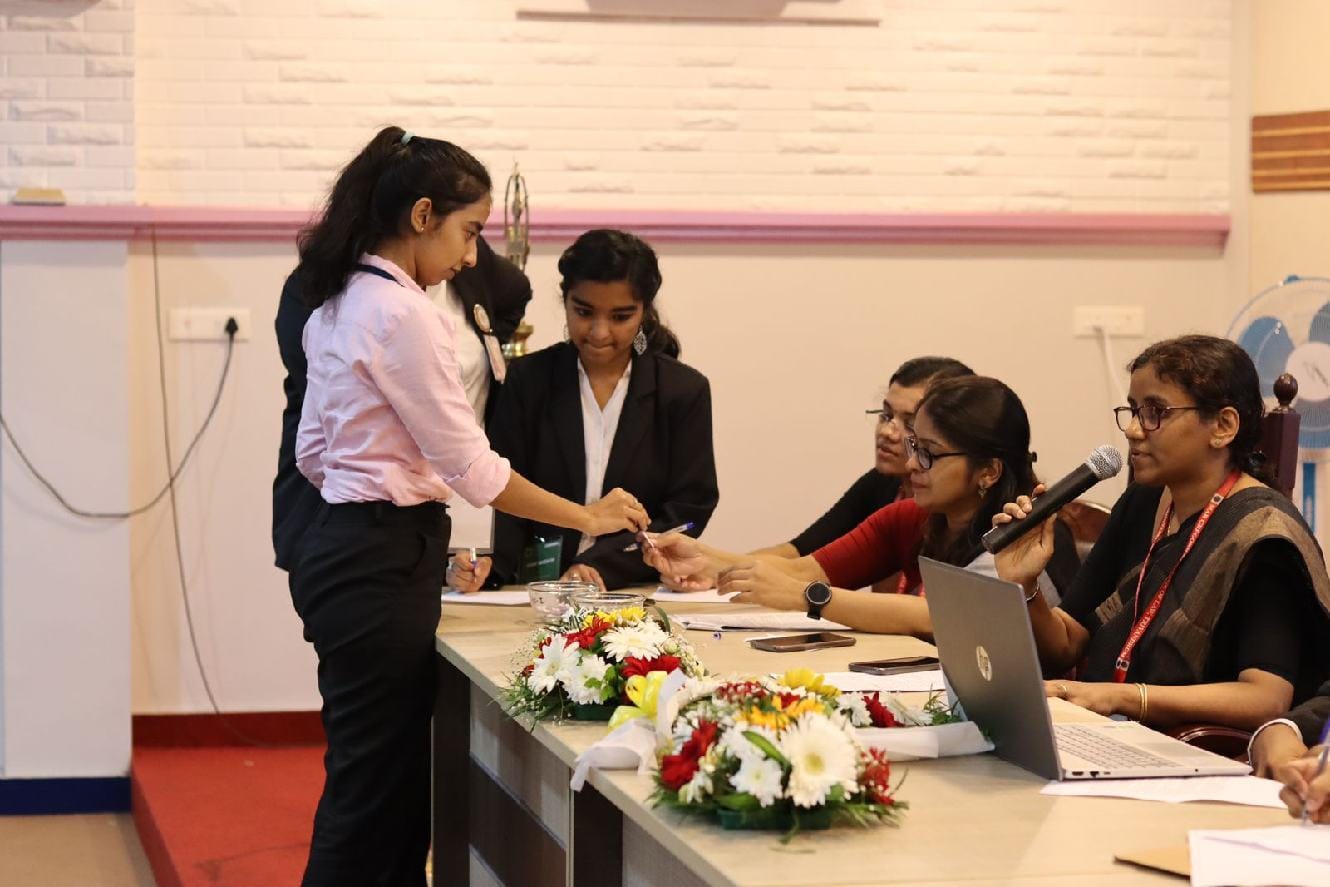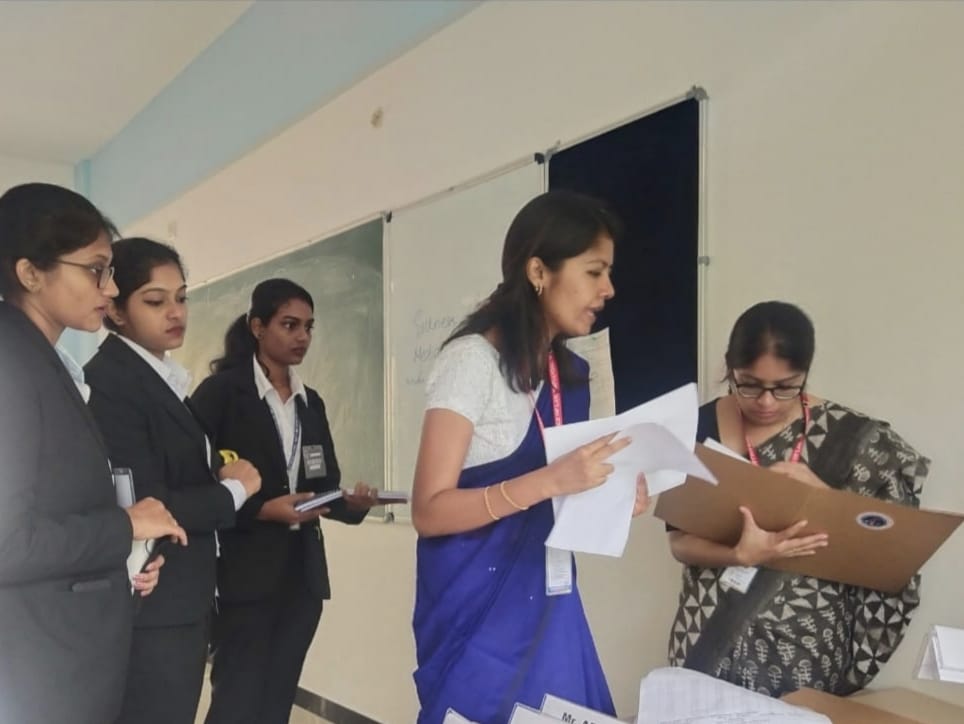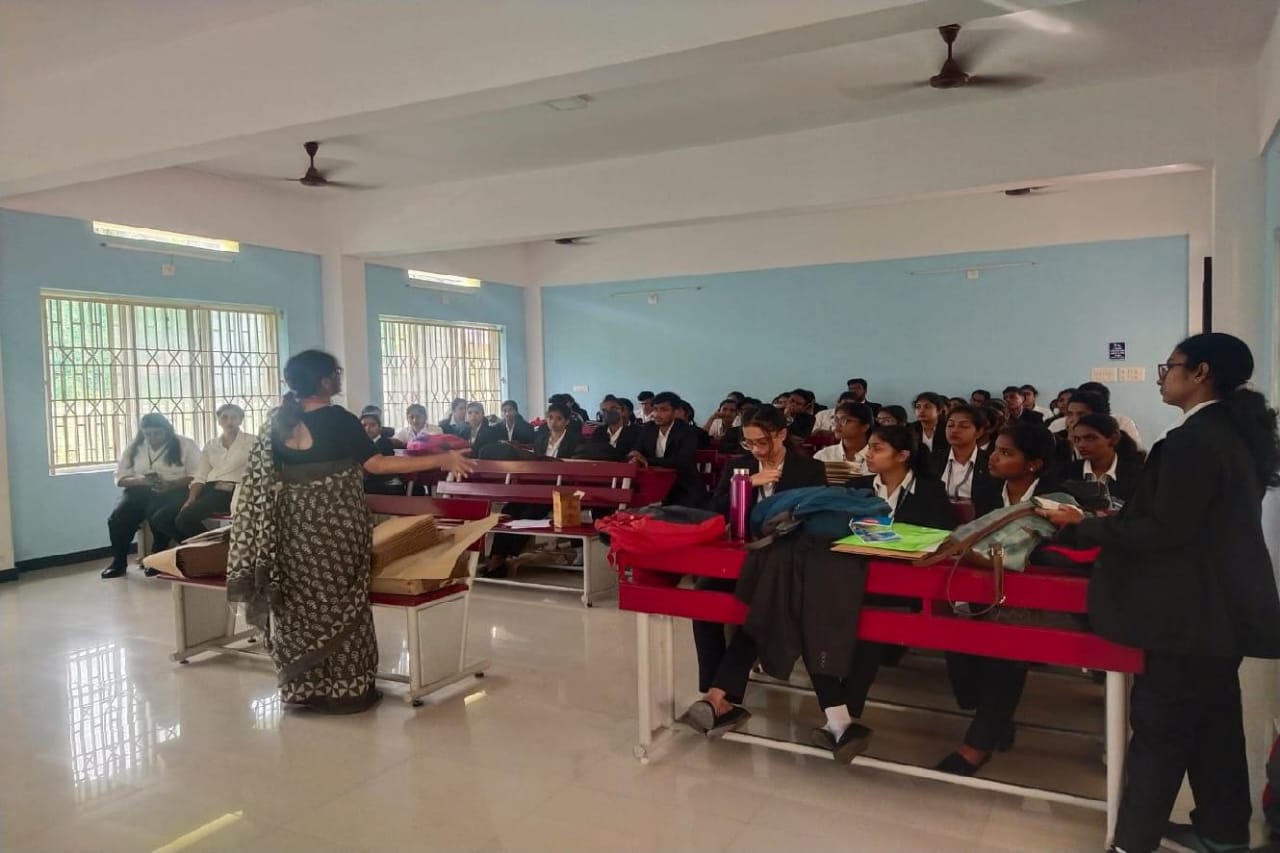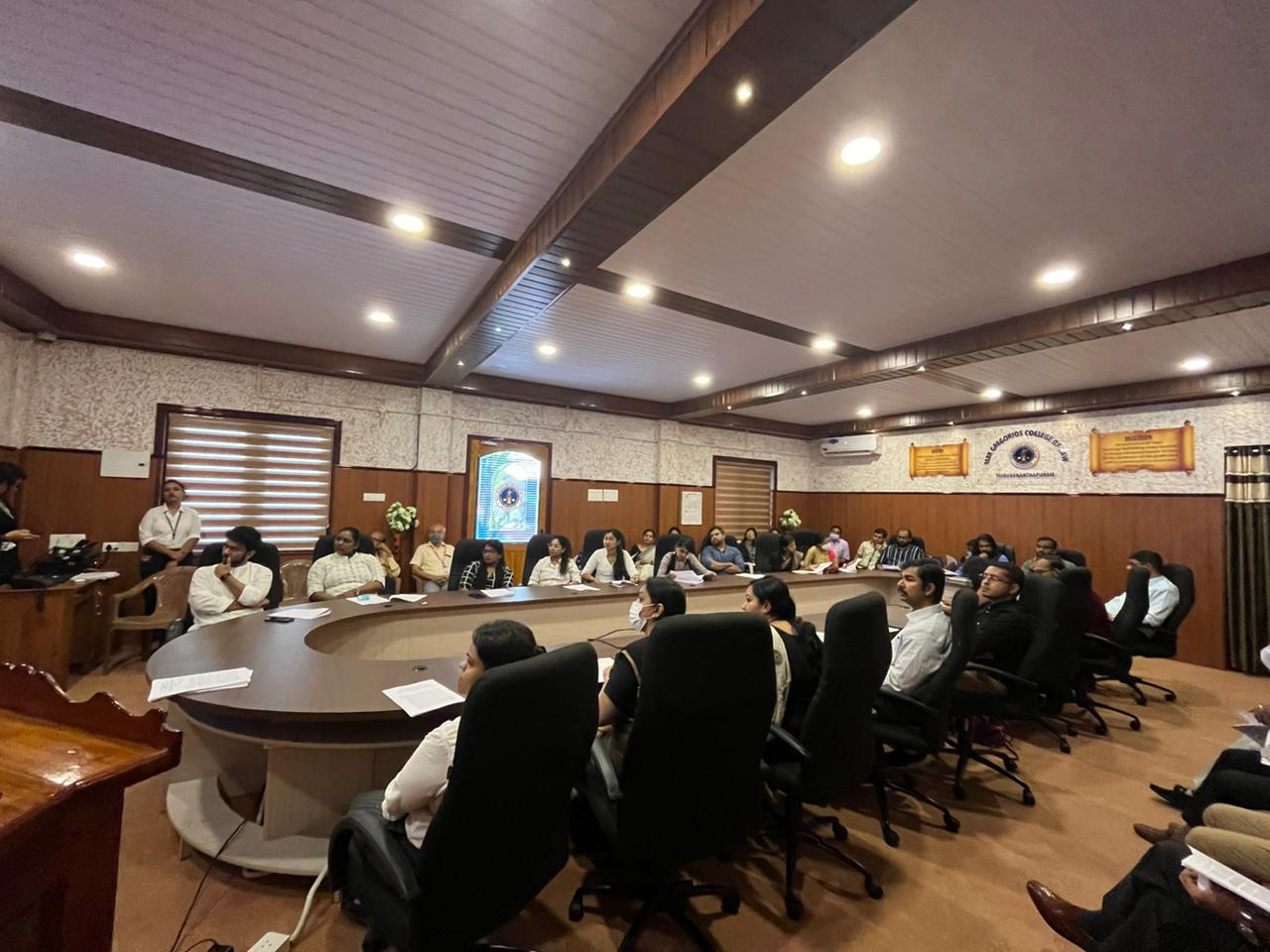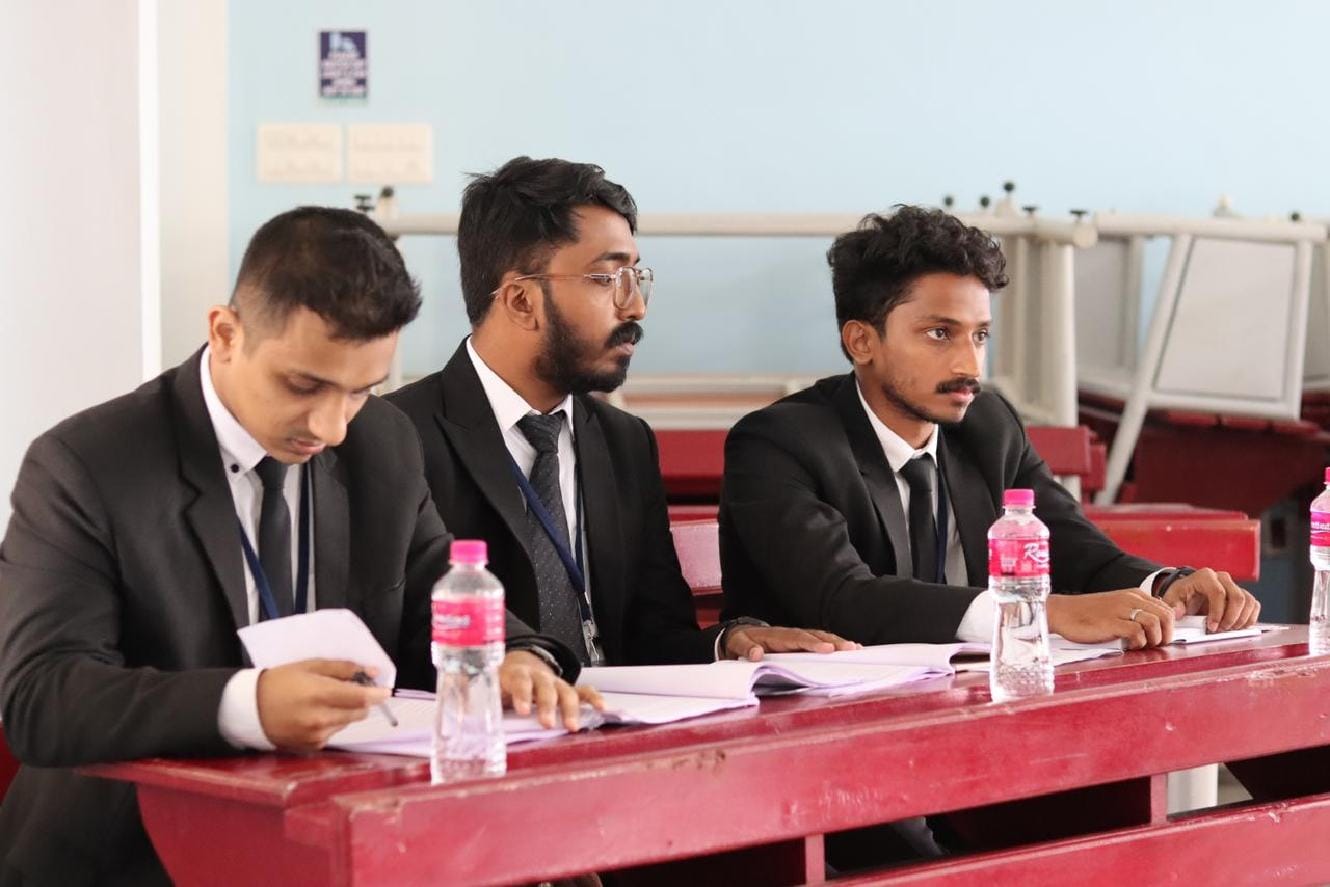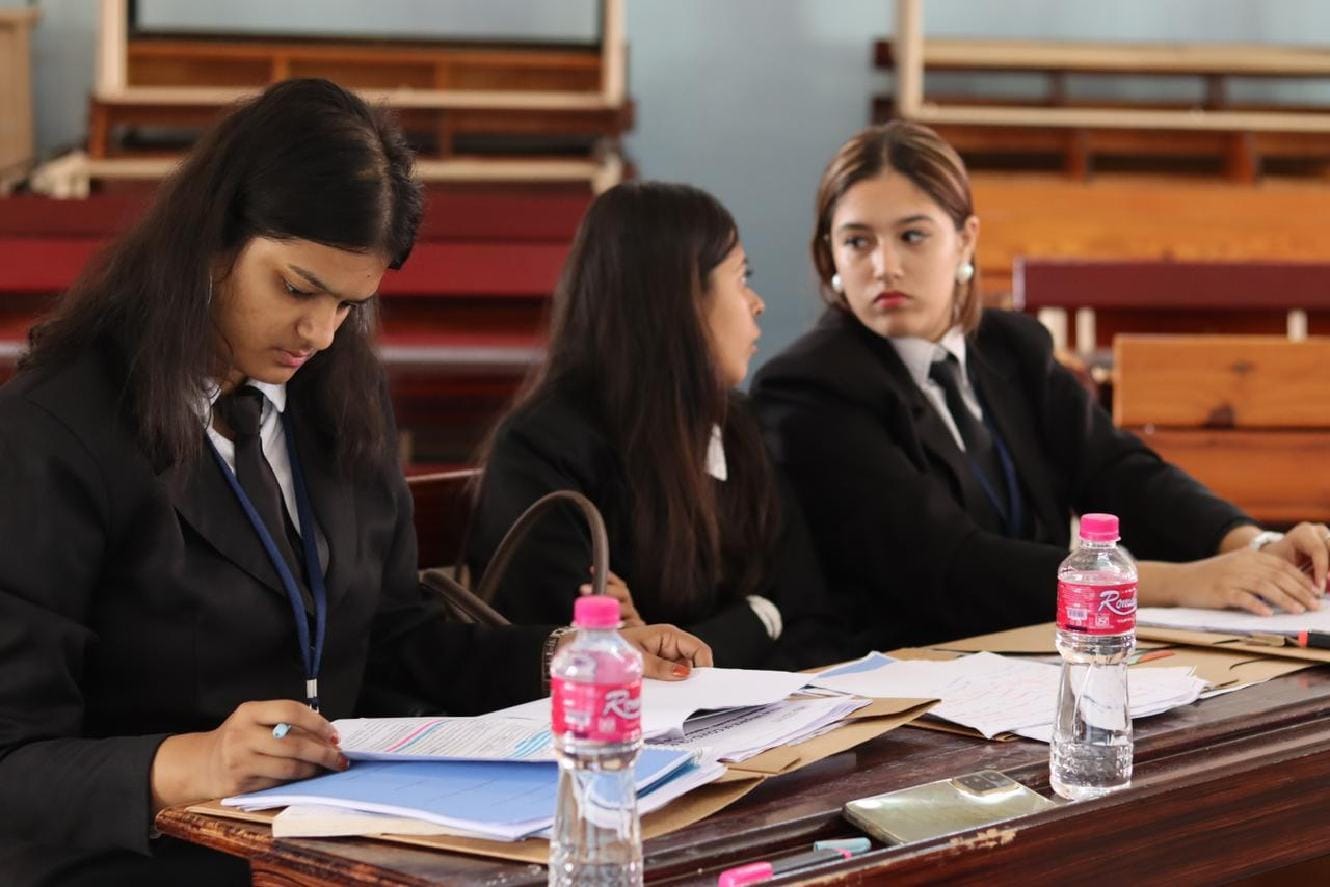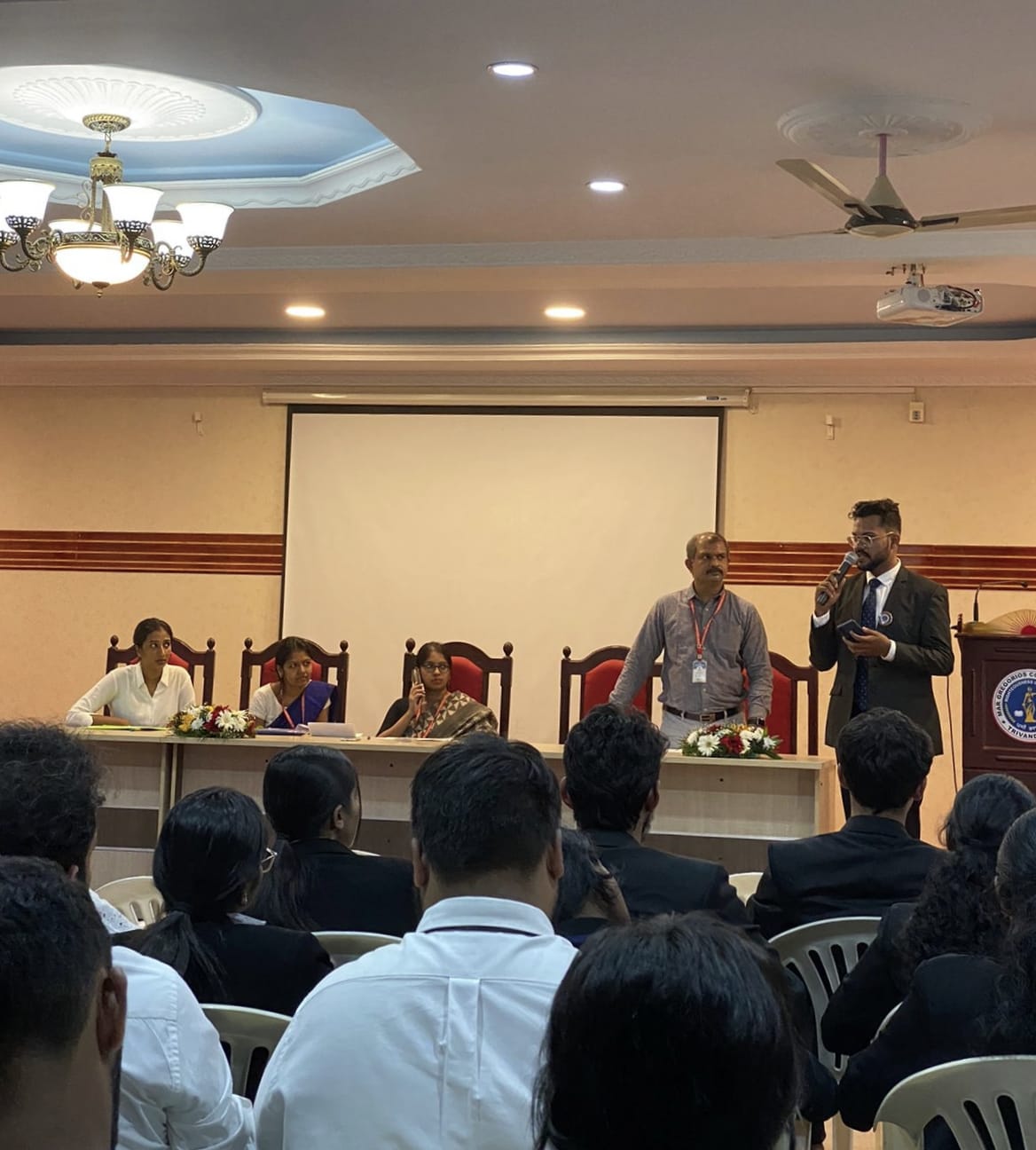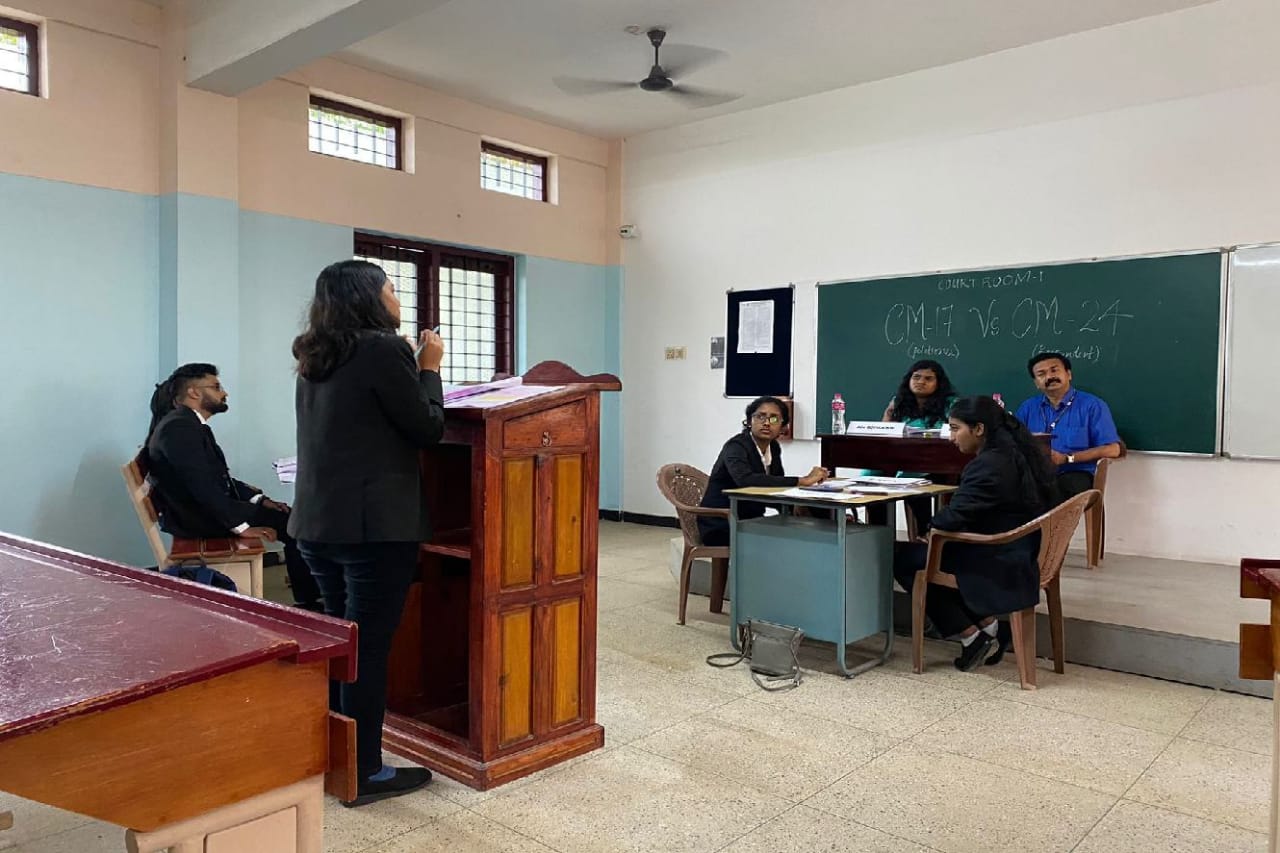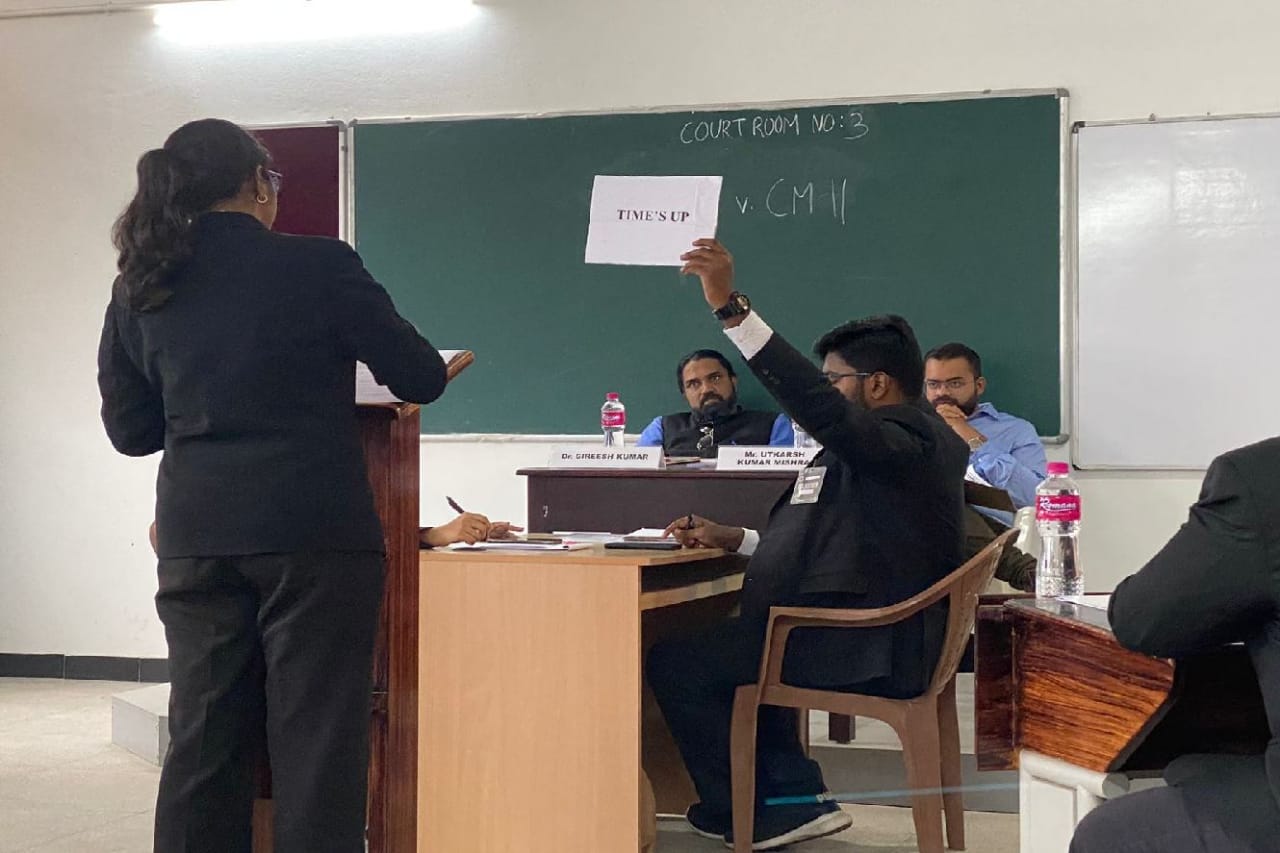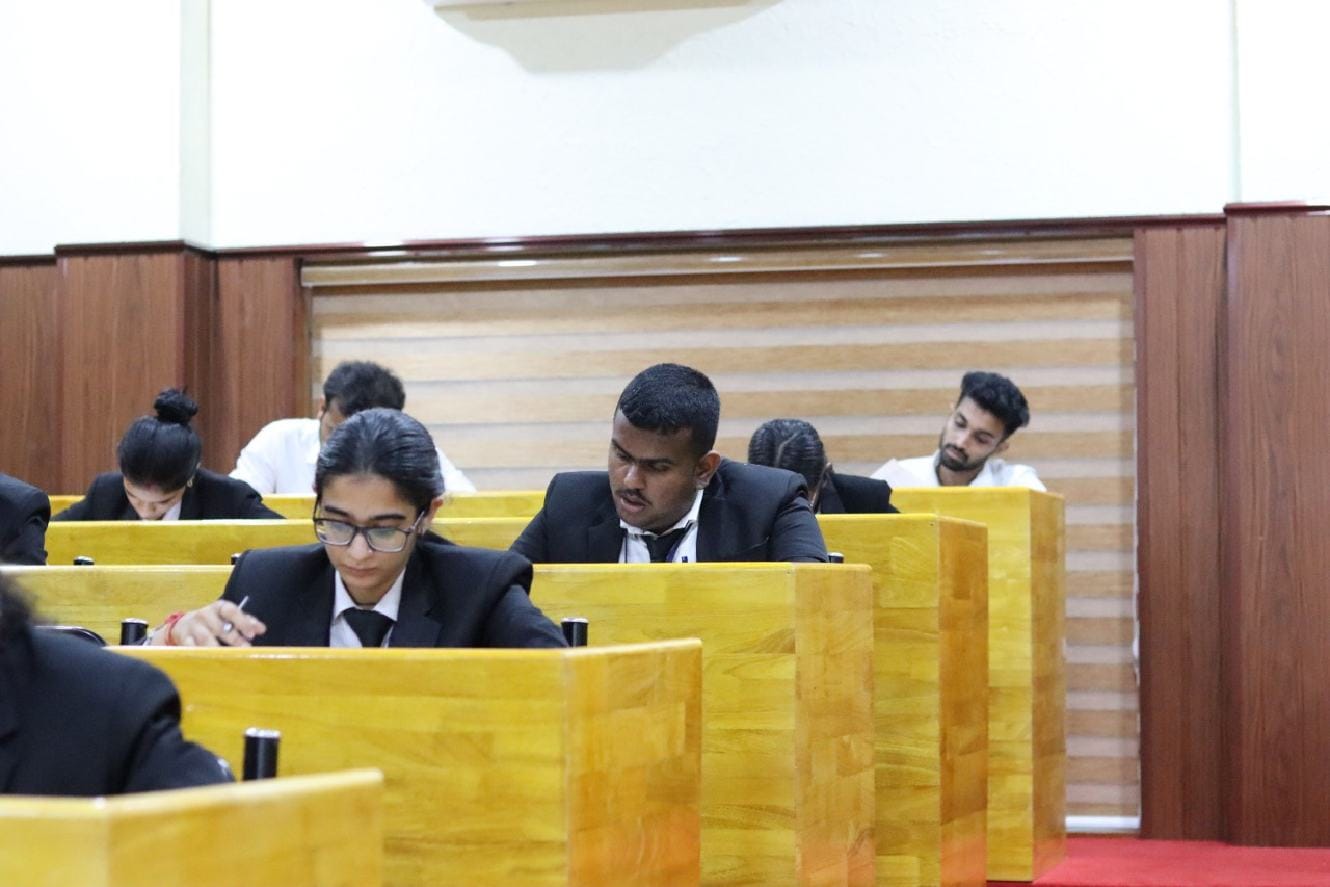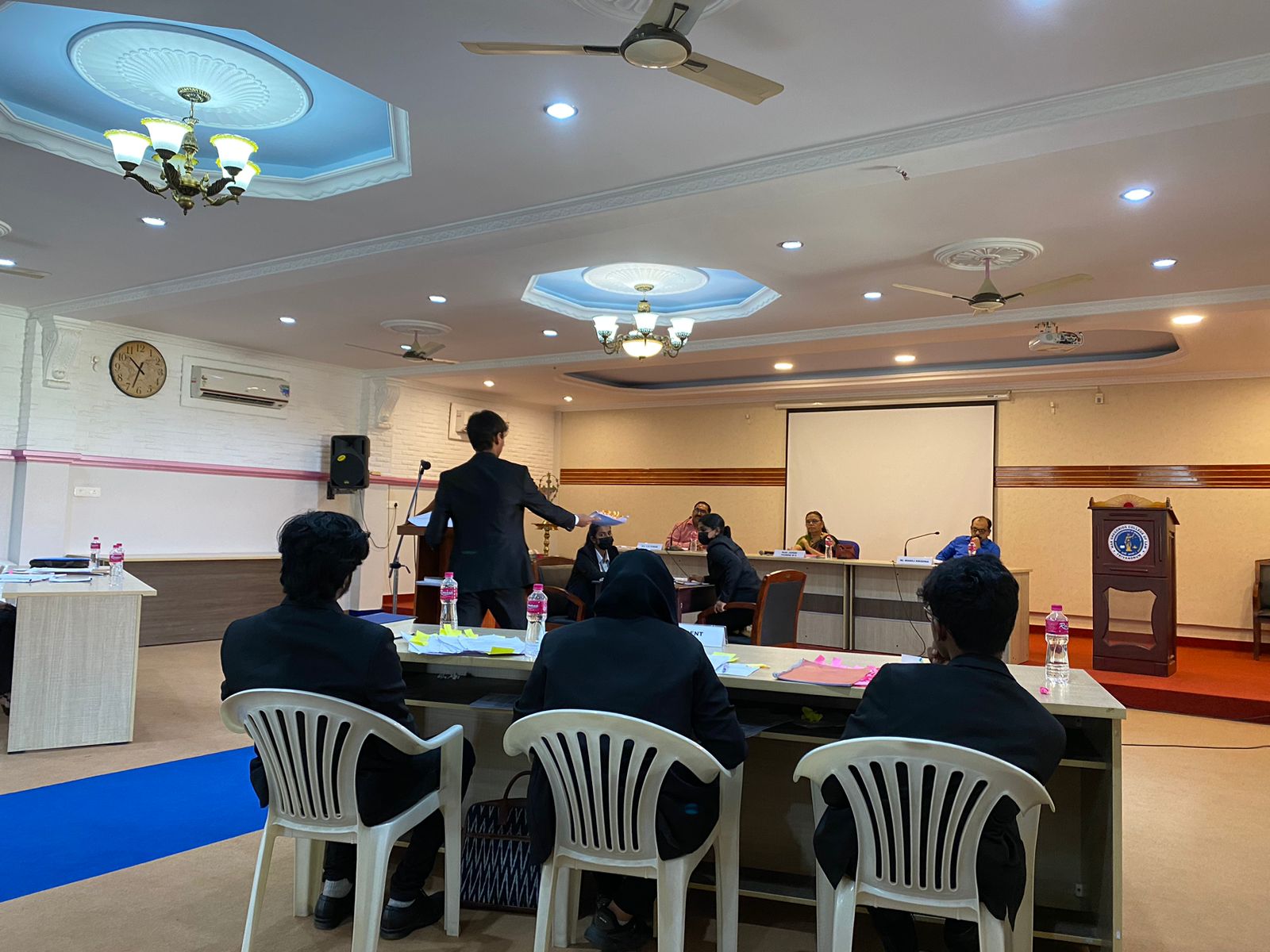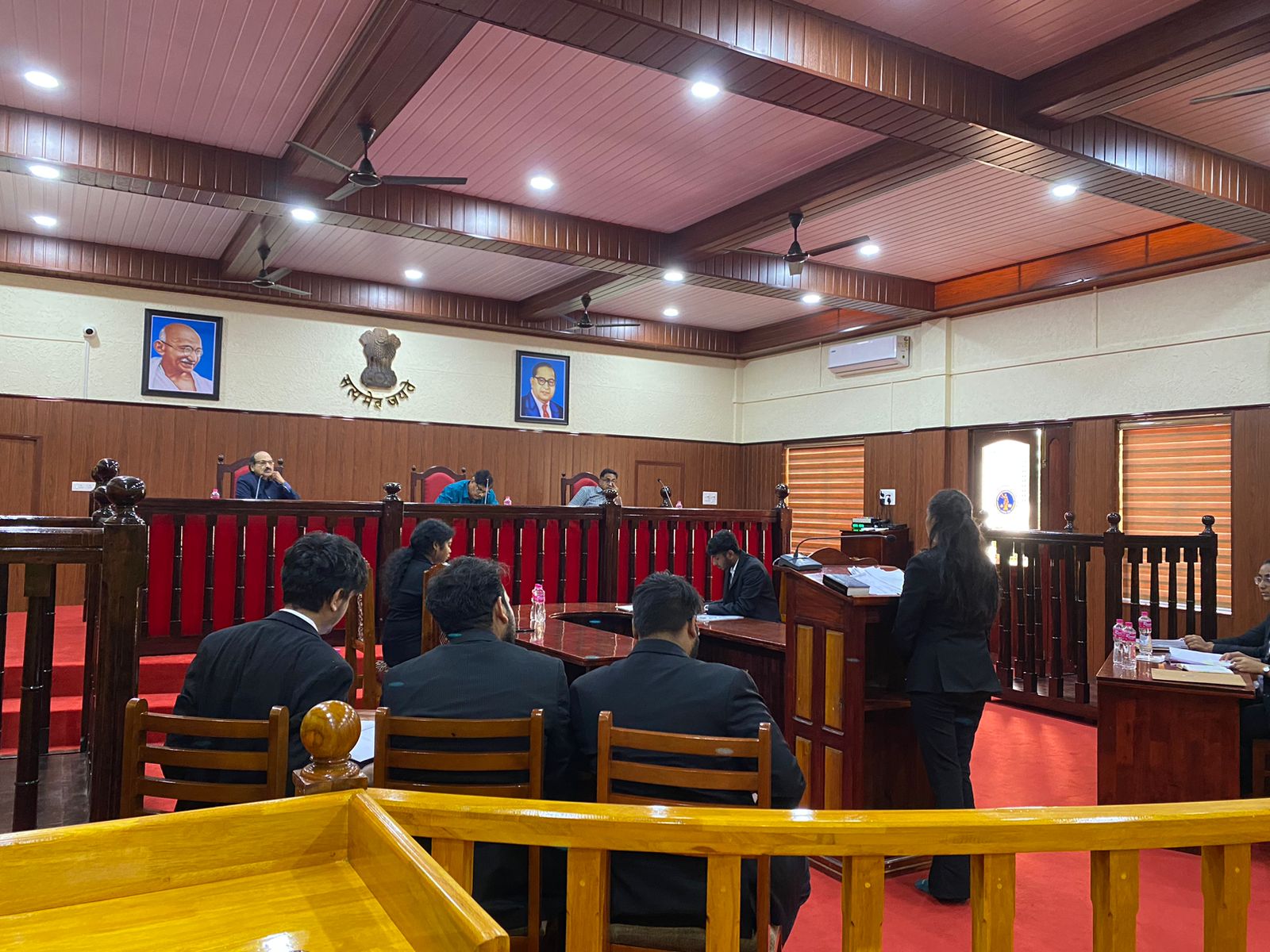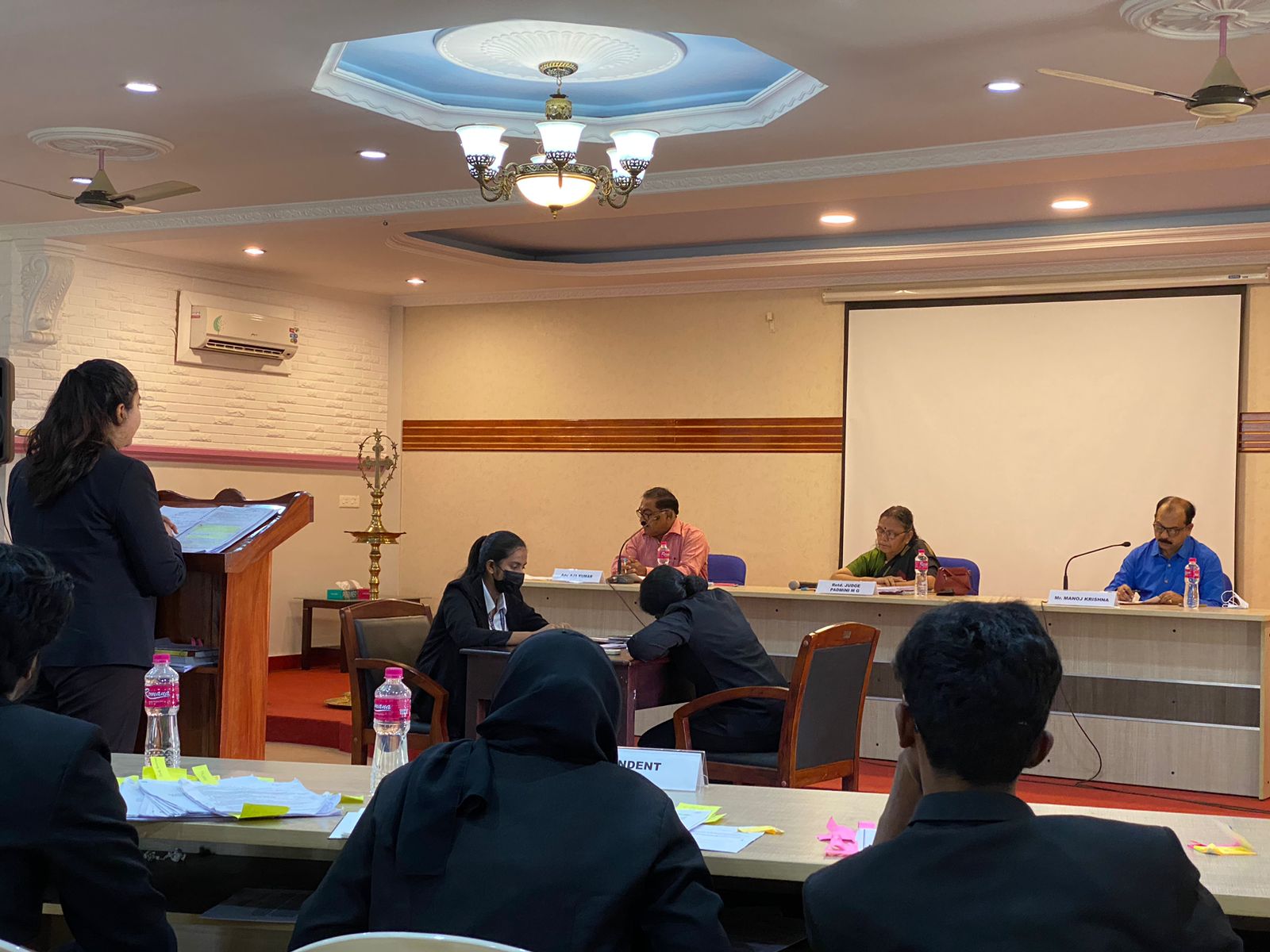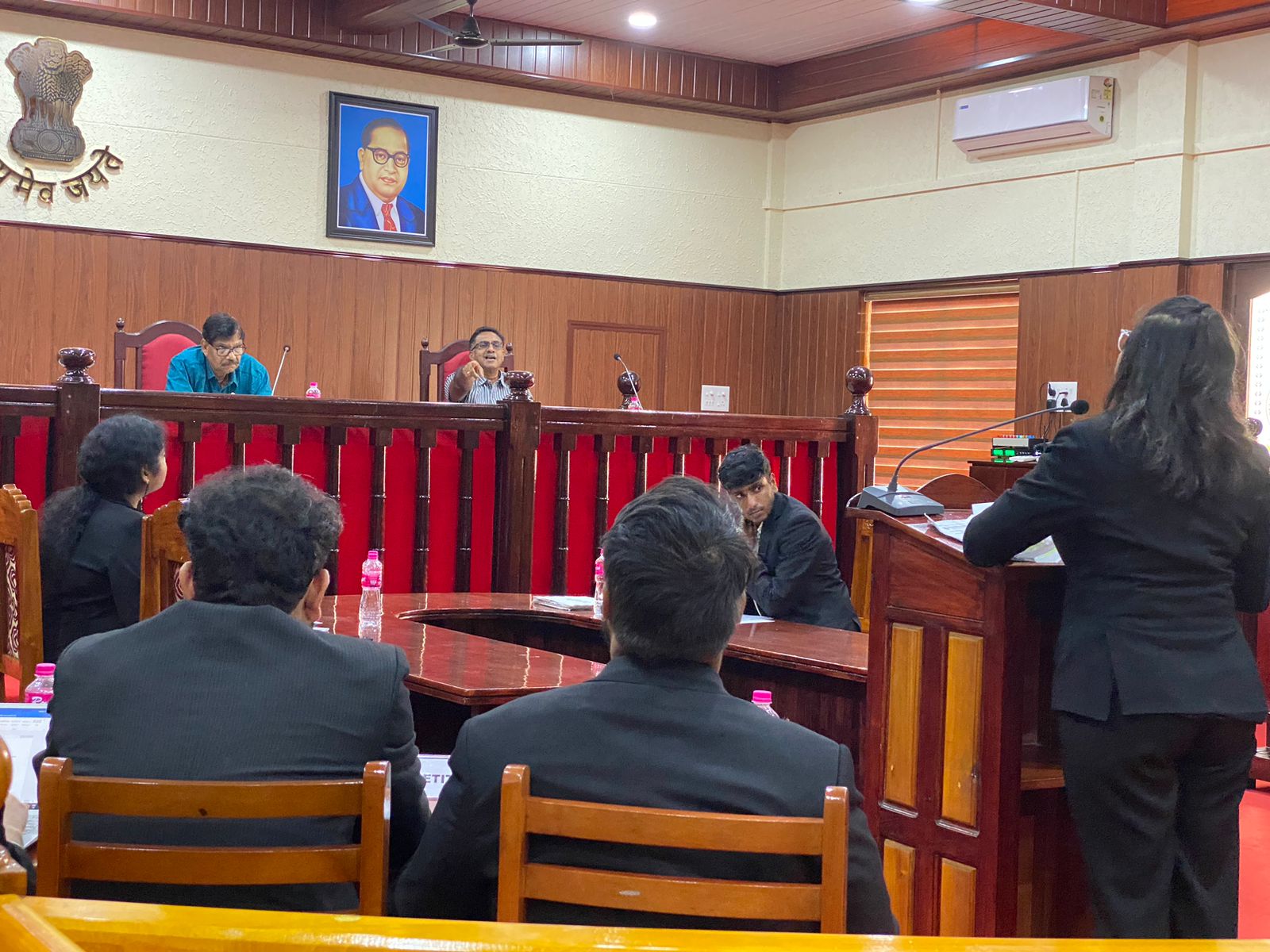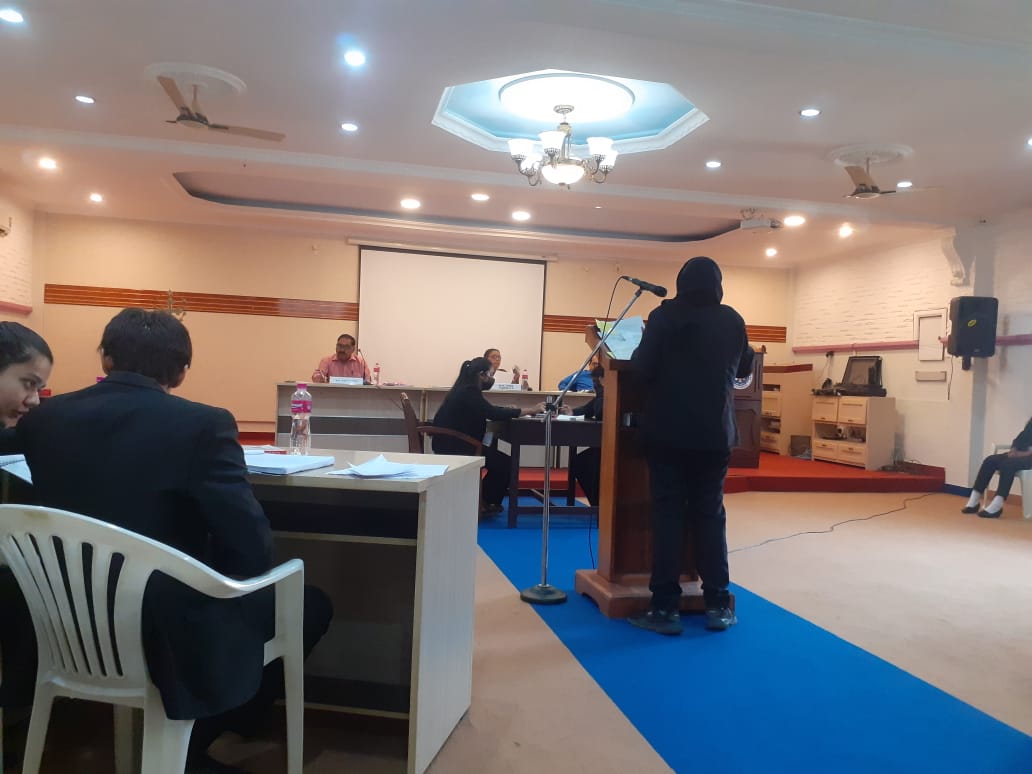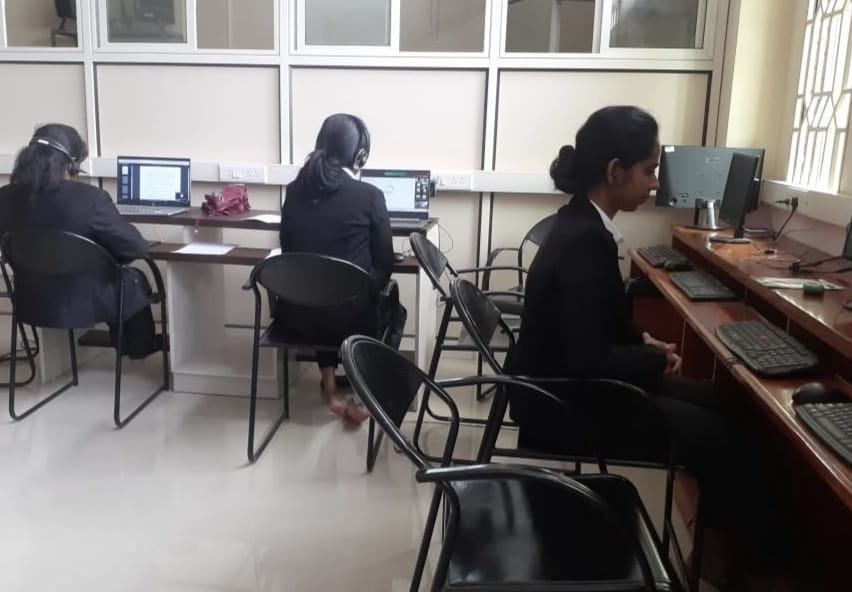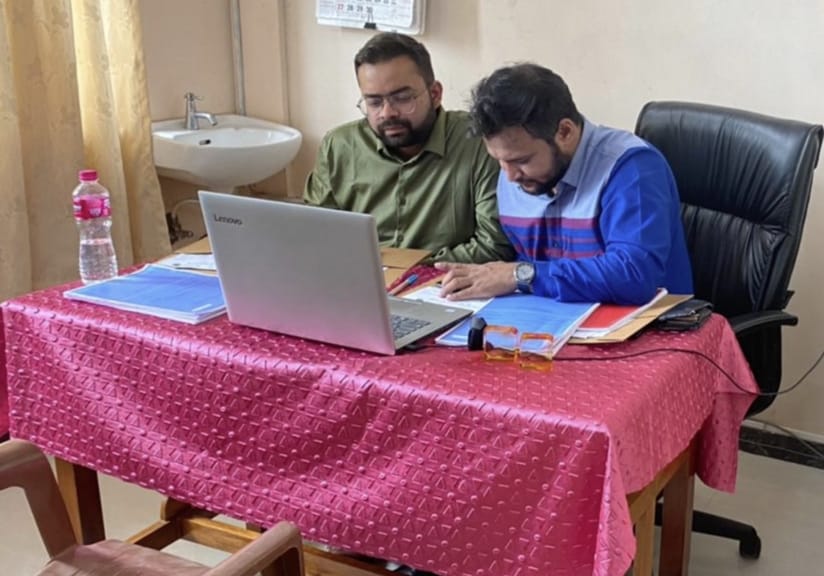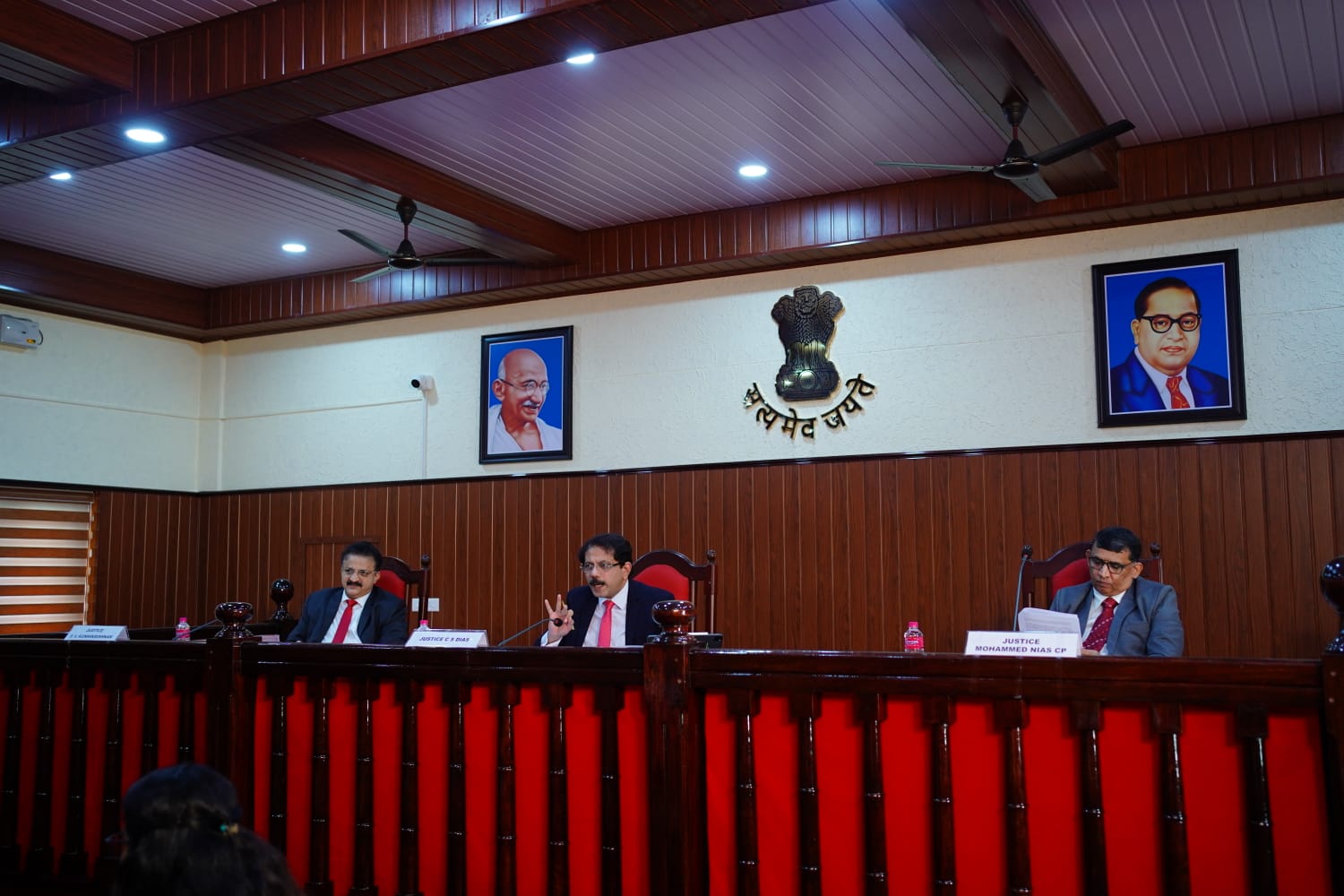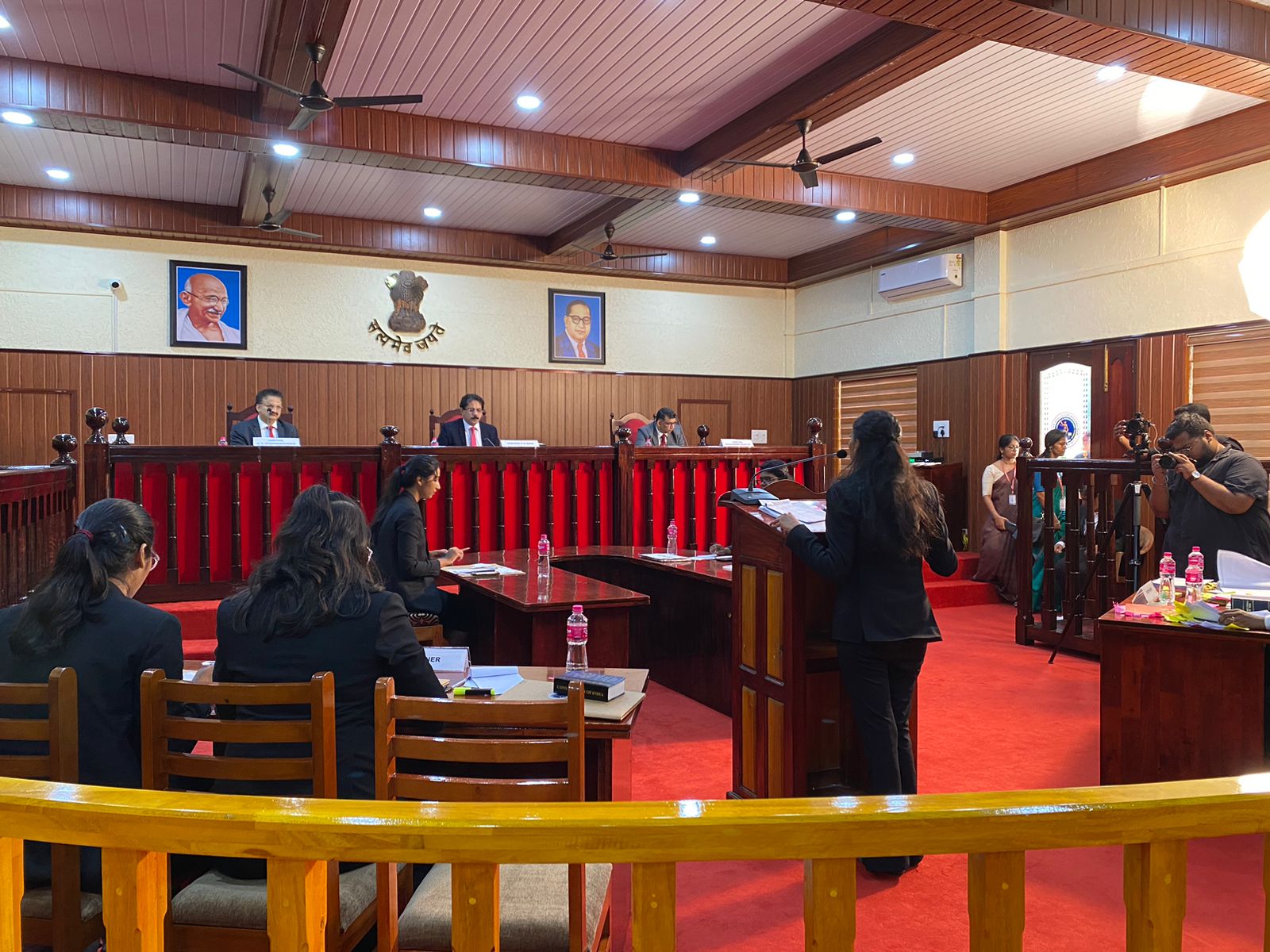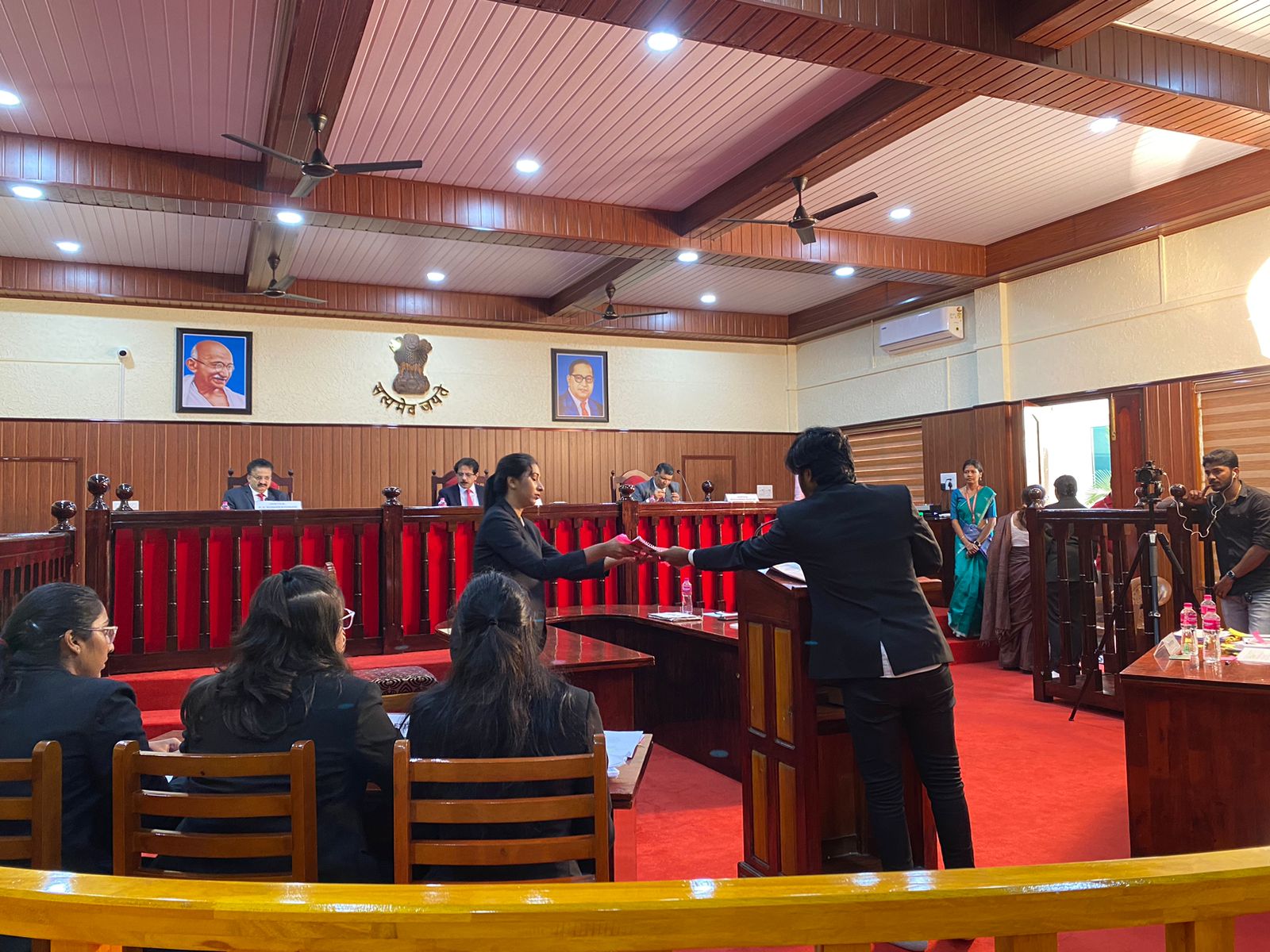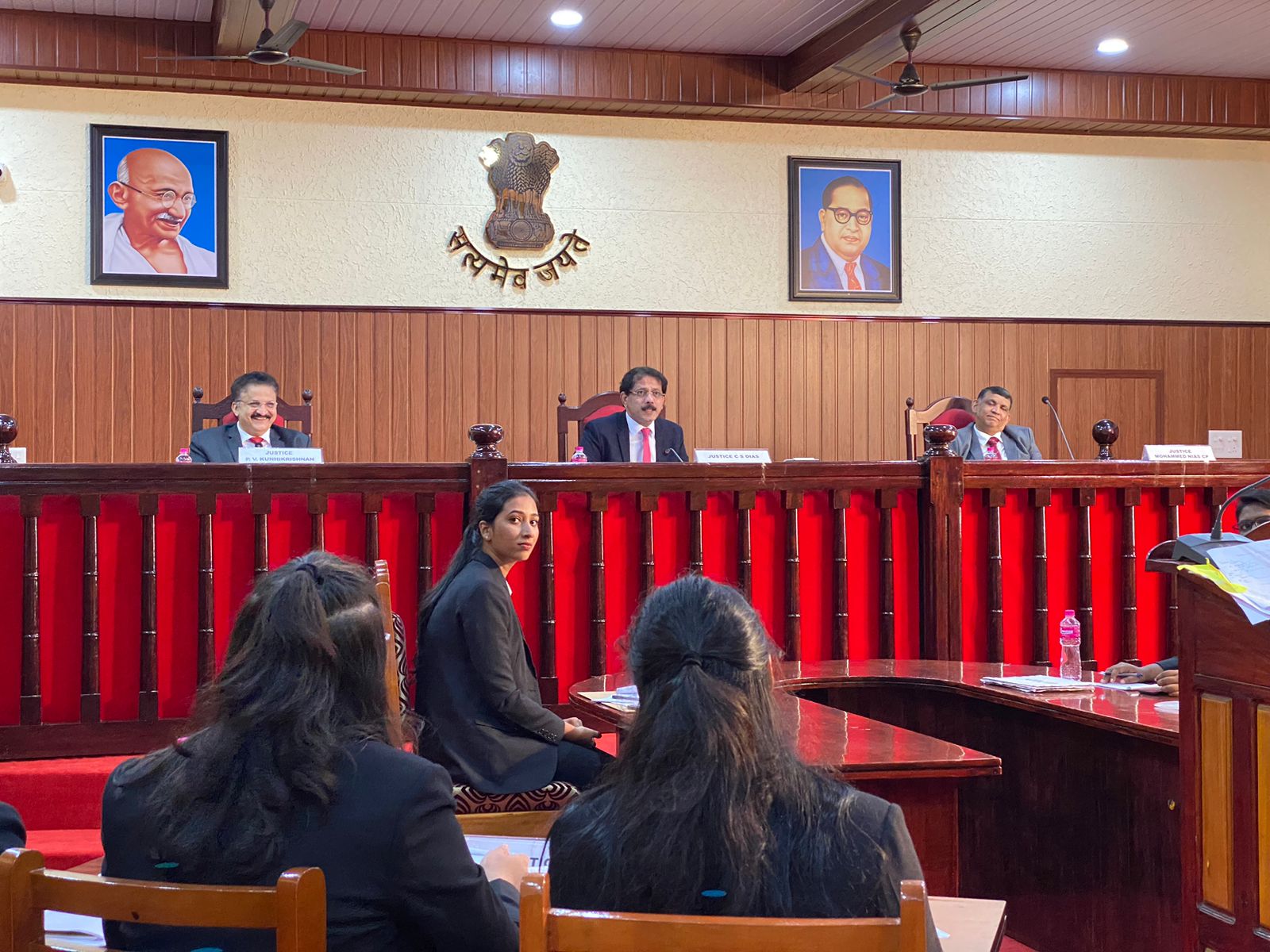The Asia Chapter of the 2022 CLEA Mooting Competition will commence with the National Round for India, Sri Lanka and Bangladesh. It is conducted at Mar Gregorios College of Law, Thiruvananthapuram, in association with the Commonwealth Legal Education Association (CLEA), from 10th to 12th November, 2022. The Mooting Competition is held biannually by CLEA and the Commonwealth Lawyers Association (CLA) wherein representatives from the Commonwealth regions of North America, United Kingdom, Caribbean, South Asia (India), Pakistan, Bangladesh and Sri Lanka, Southeast Asia, South, West and East Africa, Australasia, and the Pacific compete for the ‘Common Wealth Shield’. The initiative has grown over the years and attracts fine talents, providing a platform for students to participate, interact and gain exposure.
Mar Gregorios College of Law (MGCL) has been conferred with the SILF-MILAT National Institutional Excellence Award in 2017 as recognition for its exceptional contribution to legal education. The institution strives to be a platform to impart quality legal education to aspiring students.
The National Rounds will be held in four stages: Preliminary, Quarter Final, Semi-Final and the Final Round. The winning team of the National Round will represent India in the Commonwealth Moot, i.e., the Seventeenth Commonwealth Moot, 2023 to be held in conjunction with the 21st Commonwealth Law Conference, 2023.
The foremost aim of the CLEA is development of a Model Human Rights Curriculum as an exemplary model for institutions interested in offering a course on Human Rights to their undergraduate students. Current legal focus has been on the recent debacle of the global pandemic which ensued in a barrage of human rights violations and ill-suited counter-measures by governments worldwide. Ergo, the topic for this edition of the CLEA Moot aims to explore the nuances of human rights, constitutional and labour law.
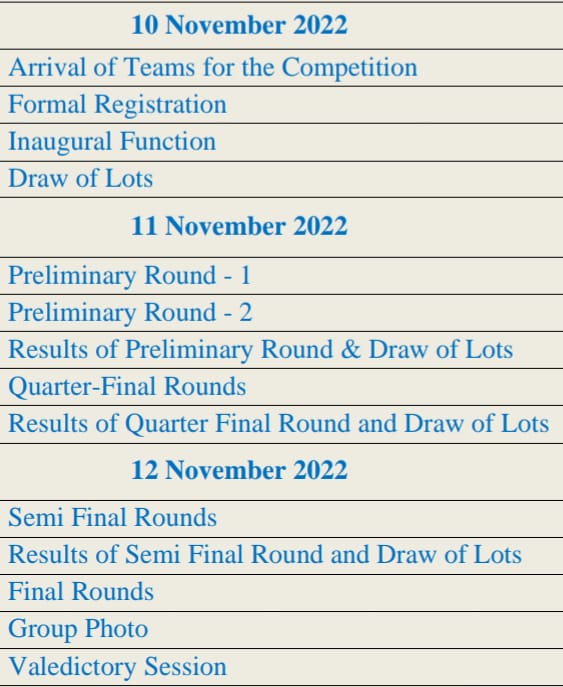
Day 1
10th November, 2022
2:00 PM – The participating teams have arrived at Mar Gregorios College of Law (MGCL), all suited up and schooling their excitement to engage in erudite discussions with fellow participants.
2:30 PM – The teams are getting acquainted with their designated liaison officers as they are shown around the campus and proceed to formal registration.
3:00 PM – The stage is set for the commencement of the Inaugural Ceremony as the audience trickle in and eagerly await the distinguished guests of the day- Shri. P. Rajeeve, Minister for Law, Industries and Coir, Govt. of Kerala, Prof. Dr. Dilip Ukey, Vice-Chancellor, Maharashtra National Law University, Mumbai, Prof. Dr. S Sivakumar, Senior Professor, Indian Law Institute, New Delhi, Vice President and Trustee of CLEA, President of CLEA South Asia.
3:30 PM – The co-hosts of the day, Aleena Johnson and Athera Gopan kick off the function and cordially welcome the dignitaries, members of the organising committee, participants and audience to the event.
3:45 PM – Respected Principal Dr. John PC and venerable Director Rev. Dr. Koshy Isaac Punnamoottil escort the dignitaries to formally begin the event by lighting the lamp. Also joining them onstage are Mrs. Sushma George, Assistant Professor, MGCL and Dr. Gigimon V. S. Executive Member, CLEA (South Asia) and Associate Professor & Head of the Department, MGCL. Athera Gopan and Muhammed Nihaal, President and Vice President of the MGCL Moot Court Society respectively, also take to the stage for the lighting of the lamp.
3:50 PM – The Principal takes to the stage to deliver the welcome address and heartily wishes all participants luck and fortitude.
4:13 PM – Shri. P. Rajeeve delivers the Inaugural Address. He earnestly states that the profession of law is a noble calling and how pertinent it is to use it as an instrument of social design. He also delves a bit into the ideology and culture of Indian Constitution, narrating a pertinent incident during the Constituent Assembly Debates. Some members, namely H.V. Kamath mooted vigorously on whether to frame the preamble of the Indian constitution ‘in the name of God’, until the assembly finally rejected the proposal. This calls attention to the dedication of the constitution draftsmen and their attention to even the general wording of the constitution that could inspire thought waves. Mr. Rajeeve emphasizes that the true essence of the lies in the Constituent Assembly Debates and asserts that mooting is what bears efficient lawyers and as well as individual development.
4:30 PM – Dr. Dilip Ukey takes the stage and cites several cases and adeptly brings up the paramountcy of case law while simultaneously bringing up legal scholar Upendra Baxi’s view on the import of the Indian Constitution. He briefly excerpts from the landmark cases of Maneka Gandhi and S.R. Bommai. He stresses that students of law must entirely familiarize themselves with judgements to develop an understanding of law. Professor acknowledges that mooting unravels the intricacies to interpreting law and inculcates the skills of advocacy, articulation and legal reasoning.
4:40 PM – S. Sivakumar takes the stage and addresses the students enthusiastically, putting the students’ knowledge to the test and quizzing them on distinctive provisions of our constitution. He also fondly recalls his teacher Dr. N. R. Madhava Menon, renowned legal educator, and his mission towards furthering legal education. The constitution given to him by Professor Sivakumar as a memento, continues to adorn the MGCL library and he urges the students to hold it to their heart, this vanguard of our life and liberty. He ends his address with a quote by Bradley Whitford, “Infuse your life with action. Do not wait for it to happen. Make it happen. Make your own future. Make your own hope. Make your own love. And whatever your beliefs, honour your creator, not by passively waiting for grace to come down from upon high, but by doing what you can to make grace happen”.
4:59 PM – The Director of MGCL, Rev. Dr. Koshy Isaac Punnamoottil renders the vote of thanks and concludes the formal event.
5:00 PM – The Inaugural Session comes to an end with the National Anthem.
5:06 PM – Participants dispersed for tea.
5:52 PM – The participants regroup for a briefing session by the organizing committee on the rules and penalties.
6:15 PM – Participant teams are called up to draw the lots which is to decide the courts and their side of the counsel. The 32 teams will be filing into their designated 16 courts which are to operate simultaneously. The teams exchanged their memorials under the supervision of the organizing committee.
7:02 PM – Day 1 concludes as participants disperse for dinner.
Day 2
11th November, 2022
7:15 AM – Day 2 begins with the arrival of the competitors, all fired up and bustling about as they head for a quick breakfast.
8:00 AM – Meanwhile, the court management team holds a meeting to review the game-plan as the organizing committee drills through the rules of procedure and the court managers harmoniously weave through their myriad duties.
9:30 AM – The esteemed judges for Preliminary Round 1 & 2 are engaging in a briefing session wherein they are intimated the rules and penalties for the competition. They will be given an overview of the problem and the bench memorial in question.
The problem for CLEA Mooting 2022 South Asian rounds is as follows- In the country of Rosehill owing to the pandemic, a countrywide lockdown was imposed to curtail the spread of the virus. Factories and workplaces were closed leading to a loss of livelihood for millions of workers. The circumstances resulted in a humanitarian and health security challenge and an exceptional logistical nightmare. The focus of the case lies in whether the government-imposed restriction and counter-measures were ultra-vires of the constitution. The government suspended significant labour laws to incentivize economic and industrial activities in the State. The Central Government also made mandatory, a personal tracking application- CoviTrack, which brought up concerns regarding the safety of the privacy of the data stored. There were allegations of excessive surveillance through drones by the centre. Reports also brought to light that private laboratories had resorted to conducting vaccine trials on humans without any preclinical trials on animals, as well as unaccountable testing on orphans from slum areas in the capital region of Braavos.
In this background, Association of Democratic Rights (ADR) has filed a writ petition before the Supreme Court of Rosehill challenging various actions of the Government during the covid period. The Supreme Court of Rosehill has admitted the petition and framed the following issues for consideration:
1. Whether the executive order of the Government of Rosehill declaring lockdown on 25. 03. 2020 is constitutionally valid? Whether sudden imposition of lockdown via an executive order violates Articles 14 and 21 of the Constitution of Rosehill?
2. Whether the ordinance passed by the State of Braavos dated 25. 04. 2020 which suspended several labour laws, violated fundamental rights of workers, and subsequently the International Labour Organisation Conventions is valid?
3. Whether the application CoviTrack, Braavos’s sharing of the personal data of the quarantined persons on the website and use of mysterious drones violative of the right to privacy?
4. Whether the Central Government of Rosehill and the State Government of Braavos violated several human rights, both enumerated and unenumerated, under the national and international legal regime during the post Covid regime?
5. Whether the regulations issued by the Government under the Epidemic Act, 1897 on 15. 07. 2020 making vaccination compulsory violative of the rights protected by its Constitution?
PRELIMINARY ROUND 1
ORAL PLEADINGS
10:25AM – COURT 01
Petitioner 2 concludes their round of oral pleading asserting the blatant violation of the indispensable Articles 14 and 21 of the constitution, resulting from the government’s severe countermeasures to the pandemic.
The judges confer extra time to the respondents as the petitioners had gone over time in their pleading.
Respondent 1 takes the floor and backs up their arguments by citing the Disaster Management Act, 2005 and its legal ambit read with the extent of authority conferred by the Concurrent List; as well as the Directive Principles of State Policy which constitutionally binds the government to implement measures for protection of public health. They also bring up the pertinent point that Article 21 – Right to Life, also recognizes the right to health and cites cases for the same. The judges go on to question the respondent on whether there ought not to be a balancing facet to whatever measures the government takes to the upholding of individual interests.
10:45 AM – Court 02
The Court had moved onto the rebuttals. The judges dissected the respondent would feel if their personal information as part of medical treatment disclosed by the state and how the respondent could justify the violation of right to privacy? The respondent contended that the state was only trying to contain the spread of the virus.
The judges state that the purpose of the tracking app was arbitrary and that the government could have adopted other measures without compromising the rights of the citizen. The petitioner during rebuttal, contends that the surveillance measures of the govt are not in accordance to any provisions of the law. They also point out that the respondents were inefficient in discharging their duty accountably and as such did not have any case.
11:05 AM – Court 04
During the rebuttals, the counsel for the respondent argued that the Government action of suspending the right to privacy of the citizens was well within its ambit, for it was carried out in the interest of the public. Further, they went on to say that the State’s decision to do away with certain labour legislations was to stabilize the economy and not in favour of the affluent sections of the populace as contended by the petitioners in their pleading. The respondents also bring to the fore, the statement of the petitioners that the vaccination schemes undertaken by the government were ineffective; they had not provided produced statistical evidence or reports to corroborate such an allegation.
PRELIMINARY ROUND 2
CASE PRESENTATION
12:03 PM – Court 10
The Petitioner begins presenting their case and submits that the executive order by the government was constitutionally invalid as it violated Articles 14 and 21, as well as opposed to the pertinent doctrine of the separation of powers. They also point out that the government action in the present scenario suffers from an excessive delegation of legislation and curtails essential legal and fundamental rights which are not to be encroached at any time. The Petitioner reasons that such an arbitrary order as in the present case should not have been made by executive action. The judge reasons that a lockdown was the most common adopted measure to counter the pandemic and the counsel asserts that they do not condemn the notion of lockdowns, but only the inefficiency and insensitive inequity with which they implemented it; this resulted in the disparity between circumstances from state to state, rendering certain states carrying burdens they need not have. They emphasize that the need of different states vary and that the government initiatives were not within the ambit of the National Disaster Management Authority Act.
12:25 PM – Court 16
The petitioner maintains that the data collected by the personal tracking app exceeds the requisites for which the app was intended and that it was not executed in proportion to the State’s interest. They also propound that private rights were exposed to public scrutiny and reminds the court of the drones employed by the State and how it was used as a ‘weapon of surveillance’ and functioned like a ‘Police State’. They submit that the vaccination regulation in action was not reasonable and quite excessive. The petitioner also condemns the curtail of Right to Freedom of Movement and Right to Movement and prays for the court to recognize the invalidity of the government implementation, especially that of suspension of labour laws which is a gross violation of workers’ fundamental rights.
12:35 PM – Court 15
The respondent stresses that the limited time frame compelled the government to not remain passive and undertake swift action so as to curb the spread of disease, prioritizing its duty to protect the lives of citizens. The judge questions as to what the reason was applied while enforcing the orders and the pleader voices that the criticality of the situation which endangered public health and dismantled the healthcare system practically compelled the government to go through with strict measures. It was crucial to remember that the State did not possess sufficient infrastructural facilities to soften the blow on its economy. They reason that their course of action cannot be labelled unreasonable merely because they are harsh. The question of liberty would come only secondary to that of life. They assert that the unprecedented situation called for hasty but feasible approaches for the primary goal was welfare.
12:49 PM – Court 13
The judges declare that the economic measures undertaken by the government should have been subjected to review to facilitate an element of efficiency under control. Respondent 1 chooses to highlight the plight of the epidemic and the burden of the government; Fundamentals rights are not absolute. Respondent 2 takes the stage and insists that the state had to enforce regulation as the restriction were necessary in the face of possible deterioration of the public health machinery. The drones villainized by the petitioners were a mere welfare oriented effort on the part of the State. The judge pursues a line of questioning asking the respondent to justify their contention with relevant case laws.
01:01 PM – Court 12
The judges question the respondents based on their contentions and proceeds to ask for a definition of human rights as well as the extent of the Right to a decent burial. The Respondent retorts by combing through various provisions of the Disaster Management Act, 2005 and stresses the statutory right conferred to the National Authority to adopt ‘any measures for preventing mitigating disaster’. The judge points out the intransient biological effects of vaccination and that it should not be trivialized as a temporary measure while simultaneously questioning why a person should be denied the right to choose or alternatively, the right to not avail the ‘benefit’ of vaccination. The respondent strongly stands ground and supplies that public health will be compromised if even one fails to get vaccinated.
01:30 PM – Everyone disperses for lunch.
02:39 PM – Dr. Gigimon V. S., Organising Secretary has announced the qualifiers to the Quarter Finals along with their allotted court rooms.
The following are the eight teams qualified to the Quarter Finals:
QUALIFIERS TO THE QUARTER FINALS
CM 02
CM 07
CM 11
CM 13
CM 17
CM 20
CM 22
CM 24
QUARTER FINALS
03:45 PM – Court 04
The bench and petitioner have been going back and forth about the date of a decided case related to lockdown of March 2020. The bench seems to be considering whether their cases quoted in the memorial carry weight. The petitioners have gotten penalized since a paper was passed to the presenter by the teammates when the bench drilled them on Section 3 of the Epidemic Diseases Act, 1897. It has been clearly stated in the rules that no document or chit can be passed to the presenter by the teammates while they are presenting.
04:20 PM – Court 03
The respondent contends that there was no violation of labour legislations, and the ordinance was in accordance with Article 123 of the constitution – Power of the President to promulgate Ordinances during Recess of Parliament. The actions of the government, as stated by the respondents, was a result of the unprecedented outbreak of the virus.
04:37 PM – The Quarter Finals conclude, and participants break for tea.
04:50 PM – Preparations are underway to conduct the Researcher’s Test. So far, they have accompanied their team members during the Oral Presentation.
05:15 PM – The Researcher’s Test assesses the scope, clarity of thought and language of research and naturally, the knowledge of facts of the case, legislations in question and intricacies of the Moot problem. The questions are posed in MCQ format based on applicable laws, precedents, and facts pertaining to the proposition. We see the students puzzling over the problems.
07:00 PM – The Quarter Finals qualifiers are announced as the teams cheer on in earnest after a hard day’s work of fruitful travail.
QUALIFIERS TO THE SEMI FINALS
CM 11
CM 20
CM 22
CM 24
07:15 PM – The students fall into easy rhythm around the campus and amidst mutual appreciation and camaraderie, everyone pops into the ever-lively cafeteria for a bite of dinner before bracing themselves for the final leg of the competition.
Day 3
12th November 2022
8:30 AM – The third and final day of CLEA MOOT South Asian Rounds is all set to begin as the participant teams arrive at the college and help themselves to a hearty brekkie.
9:58 AM – Esteemed Judges for the day have arrived.
10:00 AM – The second round of Researcher’s test in the form an interview is first on today’s lineup.
10:12 AM – The eagerly awaiting teams gather and the session commences with the arrival of the Respected Judges of the day.
10:34 AM – Court 02
The petitioners advance a compendium to the bench as they interrogate.
10:45 AM – Court 02
Oralist 2 of the counsel of petitioners have taken to the dais.
11:00 AM – Court 01
Oralist 1 of the counsel of respondents takes to the dais.
11:20 AM – Court 02
The bench maintains that the declaration of lockdown as it went down was illegal as it confines people to their homes, consequently damaging the means of livelihood to which the respondents reply that only non essential services were restricted and that limited rights were not suspended.
11:24 AM – Court 01
Oralist 1 of the counsel of petitioners arguments has really captivated the bench as well as the audience while she was delivering her final note.
11:24 AM – Court 01
Oralist 2 advances the compendium to the bench through the court manager as she takes on to the dais.
11:39 AM – Court 02
Counsel 1 of respondent concludes their argument stating that the constitution will prevail over provisions of International Labor Convention in circumstances of urgency or dispute and thereby the ordinance is constitutionally valid.
11:40 AM – Court 01
The Article 41 and the landmark Puttuswamy case are being discussed back and forth between the bench and Oralist 2 of the Respondents. The presenter sheds light upon the importance and benefits of being vaccinated and the statistics of a vaccinated person against a non-vaccinated person in being hospitalized.
11:45 AM – Court 02
Counsel 2 for the Respondent contends that they have not violated the right to privacy to which the bench questions how the data was collected and whether it was based on a contract or compulsion. They note that the mandatory downloading of the app brings in the element of force.
11:52 AM – Court 01
The respondents present their prayer and the petitioners present their rebuttal on several issues argued by the respondents.
11:59 AM – Court 01
The session has concluded as the judges proceed to score and evaluate.
12:00 PM – Court 02
The counsel relies on Mill’s Theory of Liberty and asserts that the State has the authority to curb liberty if it harms members of society. In the case at hand, the speaker maintains that unvaccinated people pose a threat to the health of the public.
12:06 PM – Court 02
The counsel asks for an extension of two minutes. The bench grants a minute to the counsel to summarize. The counsel concludes with the prayer.
12:07 PM – Court 02
The bench asks for a brief rebuttal as both the counsels have covered almost all relevant points.
12:10 PM – Court 02
The session has concluded and the judges move on to score the teams.
12:20 PM – Court 03 [ONLINE SESSION]
The sole team from Bangladesh, CM 34 has advanced directly to the semi finals. They are engaged in an online mooting session with CM 29.
QUALIFIERS TO SEMI FINALS
CM 22
CM 24
FINAL ROUND
2:16 PM – The Final Round of the CLEA Mooting South Asian Round commences and the co-counsel for the petitioners takes the floor.
2:19 PM – The counsel submits before the judge that the executive order by the government is not constitutionally valid and its sudden implementation of lockdown.
2:22 PM – The Bench asks for a quick rundown of the facts of the case.
2:24 PM – The bench asserts that the circumstances were extraordinary to the counsel’s plea as they moot against the constitutional correctness of the government.
2:25 PM – The bench states that there is no right if there is no life and that extraordinary situation calls for extraordinary measures.
2:29 PM – The counsel contends that the Union ought to have let the states exercise their autonomy so that equitable measures were applied across its states.
2:30 PM – The bench insists that the burden lies on the petitioners to suggest alternate judicial remedies to the case and the petitioner submits with deference that this responsibility lies with the respondents, which is rejected by the honorable judges.
2:19 PM – The counsel submits before the judge that the executive order by the government is not constitutionally valid and its sudden implementation of lockdown.
2:22 PM – The Bench asks for a quick rundown of the facts of the case.
2:24 PM – The bench asserts that the circumstances were extraordinary to the counsel’s plea as they moot against the constitutional correctness of the government.
2:25 PM – The bench states that there is no right if there is no life and that extraordinary situation calls for extraordinary measures.
2:29 PM – The counsel contends that the Union ought to have let the states exercise their autonomy so that equitable measures were applied across its states.
2:37 PM – The counsel moots that the right to be heard has been taken away the moment the government has suspended a number of legislations emphasizing that ibi jus, ibi remedium and also vigorously vouches for the many sufferings of the marginalized communities and the working class.
2:38 PM – The counsel begins the second issue and argues that social and economic interests must go hand in hand and that government ought not to have suspended the labour legislation.
2:39 PM – The counsel sums up the argument for third issue as they have run out of time focusing on the right to privacy, choice and bodily autonomy.
2:44 PM – The second co-counsel of the petitioners has taken to the dais.
2:45 PM – The counsel goes on to say that the government has killed the “democratic instinct” of the people. The bench observes that the sharing of personal information with the government was carried out in the absence of any alternative methods.
2:49 PM – The counsel submits that the data collected was abused thereby putting the privacy of millions at stake.
2:50 PM – The counsel cites instances of security companies selling off bulk personal information and health data to the dark web.
2:52 PM – The bench questions whether restrictions were not imposed in the interest of upholding national security. The counsel replies that there was no exercise of legal mandate behind the practiced procedures.
2:57 PM – The bench declares that the migrant workers were provided with food and shelter. The counsel directs the attention of the bench to the facts of the case which states that the schemes were carried out inefficiently.
3:00 PM – The counsel begins to moot for the final issue. They argue that the right to life, fair treatment and dignity extends to not only a living person but of a dead body as well. The bench states that the government had to prioritize the life of the living over the dignity of the dead under such unprecedented circumstances.
3:02 PM – The bench’s interrogation of the oralist 2 of the counsel of petitioners resumes even as the time limit has exceeded and is conferred extra minutes.
3:04 PM – The counsel argues that the mandatory vaccination was a violation of right to bodily autonomy and concludes with the prayer.
3:09 PM – The bench suspends the session for a brief break of five minutes.
3:15 PM – The court commences and the respondents approach the dais.
3:20 PM – The counsel 1 for the respondent begins by presenting the compendium to the bench.
3:24 PM – The bench asks for the provision for medical emergency in the Disaster Management Act, 2005. The counsel states that the pandemic falls under Category L3 as the State government could not efficiently sustain and thereby falls under section 2(d) of the aforementioned act.
3:27 PM – The bench questions as to which provision with regard to fundamental rights were violated by the government. The counsel argues that there was no violation of any fundamental rights.
3:30 PM – The bench refuses to accept the reference to Puttuswami case and finds the comparison between the circumstances that led to the former judgment and current pandemic case to be unnecessary.
3:32 PM – The counsel moves on to cite the Section 2 of the Epidemic Diseases Act, 1897 which grants the State the power to enact measures to curb epidemics.
3:33 PM – The bench refuses to accept the reference to Puttuswami case and finds the comparison between the circumstances that led to the judgment and that during the pandemic unnecessary.
3:34 PM – The bench asks whether power conferred to the Centre, allows the government to take away rights through an executive order. The counsel argues that there were only limited restrictions subject to reasonable conditions.
3:35 PM – To the counsel’s claim that the government performed to its best capacity at the sudden onset of the pandemic, the bench states that the government should have foreseen the pandemic as it moved across the globe and thought out measures following the guidelines of the World Health Organization.
3:38 PM – The counsel makes a comparison to other nations and their handling of the pandemic to which the bench retorts that India was the only state which imposed a nation wide lockdown.
3:42 PM – The bench states that the respondents acted without vision as the schemes for providing food facilities were put into action only after a considerable delay during which the people suffered without food.
3:45 PM – The judges lightheartedly prod that the counsel, asking the respondent to ‘apologize’ for not having sufficient copies for all three judges of the bench.
3:46 PM – The counsel submits two research papers which evidences that in ,countries where lockdowns were not imposed the transmission rates of the virus were higher. The judges find the research papers to not be credible because they can be doctored by the government themselves. The bench jokes that that they would prefer valid arguments over “humble” submissions.
3:52 PM – The bench finds that the Centre left the matter of food and shelter to the state government after single handedly imposing the nation wide lockdown.
3:54 PM – The respondent argues that ordinance only suspends the benefits under labour legislations.
3:57 PM – The counsel draws the courts attention to the International Labour Organization (ILO) digest which allows derogation of ILO convention in the situation of emergencies.
3:59 PM – The co-counsel for the respondent takes the dais and advances their compendium. The court breaks into laughter when the co-counsel pre-emptively apologizes for not having insufficient copies. The bench amusedly comments that the counsel is a fast learner.
4:01 PM – The counsel states that in order to curb the transmission of the virus’ identifying the individual and whether they have come into contact with infected persons is necessary and very much requires location data.
4:04 PM – The respondent argues that by virtue of the Doctrine of Necessity, it is binding on the government to impose restrictions.
4:06 PM – The respondent contends that any and all drones in use were used only for mandating protocol.
4:07 PM – The judges state that comparison cannot be drawn from the AADHAR case as the data was not shared or published unlike in the case at hand. The respondent argues that the information was shared in public interest.
4:10 PM – The respondent draws from a previous judgement of the apex court that data mining for the purpose of proper facilitation of resources and to legitimate beneficiaries, is justified.
4:16 PM – The respondent states that in view of compelling state interest, mandatory vaccination may be justified and also seeks support from Mill’s Theory of Liberty.
4:19 PM – The respondent contends that the petitioners did not petition before the Human Rights Commission ,given that it is the fact finding organization in case of human rights violations.
4:22 PM – The co-counsel justifies the lack of extra copies of documents as a step towards conserving and sustaining the environment to which the amused bench retorted that their case may go down the drain for this cause.
4:24 PM – The counsel moves on to the prayer.
4:25 PM – The bench grants five minutes for rebuttal as the petitioners take the dais. The counsel for petitioner alleges that the respondents have washed their hands off the consequences of their actions. The bench demands clarification in jest, whether the counsel has moved on from a legal to an emotional approach.
4:32 PM – The counsel for the petitioners holds up the Constitution and states that the respondents have chosen provisions from the sacred document selectively, upholding only those favouring thier actions.
4:35 PM – The bench asks whether or not the counsel has taken the vaccination and whether they have not personally benefitted from the same to which the counsel responds that they are unsure as to the effects of the vaccine in the absence of any scientific backing and supplies that she had eventually contracted the disease either way
4:36 PM – The counsel for the respondent begins the rebuttal. They state that no proceeding shall be instituted against state for undertaking actions carried out bona fide. They also allude to the Doctrine of Pith and Substance. The counsel spiritedly calls out various ‘unsubstantiated allegations’ the petitioners had levelled and endeavors to justify the constitutional validity of the State actions by once more citing statutory provisions.
4:44 PM – The Final Round has come to an end as everyone files out of the venue and the honourable judges gather to evaluate and score.
VALEDICTORY FUNCTION
5:00 PM – The stage is set for the Valedictory Function. The audience eagerly await the distinguished guests for the evening, Attorney General for India, R. Venkataramani; Former President, Commonwealth Lawyers Association, Senior Adv., Supreme Court, Adv. R. Santhanakrishna; Honourable Justice Mr. Mohammad Niyas C.P., Honourable Justice Mr. P.V. Kunhikrishnan, Honourable Justice Mr. C.S. Dias, Prof. Dr. S. Sivakumar, Vice President and Trustee, CLEA; President, CLEA Asia and His Beatitude Baselios Cardinal Cleemis, Major Archbishop Catholicos of the Syro-Malankara Catholic Church.
5:15 PM – The event begins as our venerable guests settle into the dais and hosts for the evening Mohammad Nihal and Sarah Stanley invite the choir for the prayer before the function.
5:32 PM – The Director, Rev. Dr. Koshy Isaac Punnamootil, delivers the welcome address.
5:42 PM – Ms. Sushma George Mathew, Asst. Professor and Mooting Secretary delivers the Report of the CLEA Mooting Competition 2022, South Asian Rounds.
5:49 PM – Prof. Dr. S Sivakumar delivers the Felicitation Address.
6:03 PM – Adv. R. Santhanakrishnan takes the stage to offer words of cheer and commendation.
6:10 PM – The Guest of Honour, Hon’ble Justice Mr. Mohammad Nias C.P. addresses the gathering, lauds the orchestration of the competition, relates his experience with moots and honest words on how adjudging competitions is not a cakewalk. He earnestly prompts the students to work hard with anecdotes of his law school days.
6:20 PM – The Guest of Honour, Hon’ble Justice Mr. P. V. Kunhikrishnan addresses the gathering and appreciates moot court competitions and encourages students to utilize the opportunity as it is the closest a student of law gets to actual lawyering experience at court while engaging and developing their skills as well as building confidence.
6:31 PM – The Guest of Honour, Hon’ble Justice Mr C.S Dias addresses the gathering; applauds the excellent competitors and extols the elegant courtroom of the college. He implores the students to remain patient for the profession surely grants gratification; “A student of law is a student for life.”
6:42 PM – His Beatitude Cardinal Cleemis, Major Archbishop Catholicos of the Syro-Malankara Catholic Church, graces the occasion with his words of wisdom. He expresses his admiration for lawyers since his salad days and voices his homage to the dignitaries.
6: 53 PM – The Attorney General officiates the release of the legal compendium – Handbook on Arbitration, Edited by Dr. Gigimon V.S., Organising Secretary of the CLEA Mooting 2022, South Asian Round, MGCL and Head of Department of Law, MGCL.
6:55 PM – The Learned Attorney General of India Shri. R. Venkataramani delivers the Valedictory Address. He notes that moot problems are edited versions of reality which offers a glimpse on what one can expect in their lives. Sir admires the campus and shares his heartfelt enthusiasm on witnessing the spirited students and encourages them to explore the intricacies of law. He talks of his roots in Kerala and fondly recalls his Professor Dr. N. R. Madhava Menon. Sir talks about the transformation of the apex court from days bygone and his philosophy of lawyering.
7:25 PM – The long awaited results are finally announced! Shri. R. Venkataramani unveils the winners and the prize distribution ceremony for the participants, commences. Trophies, certificates and cash prizes are given away by the esteemed dignitaries.
7:43 PM – The Principal, MGCL, Dr. John P.C, renders the Vote of Thanks, bringing the Valedictory Ceremony to a stately end.



